#something about this colour palette and the melancholy of it all
Photo
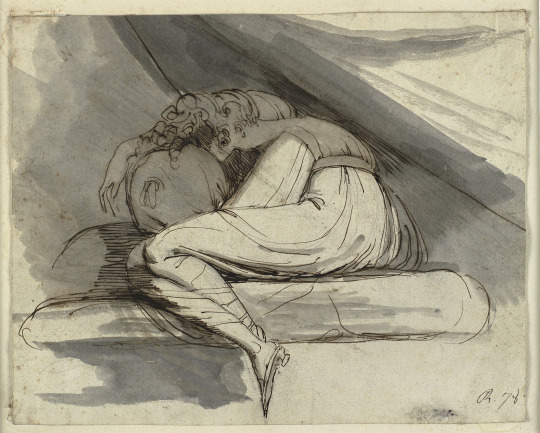



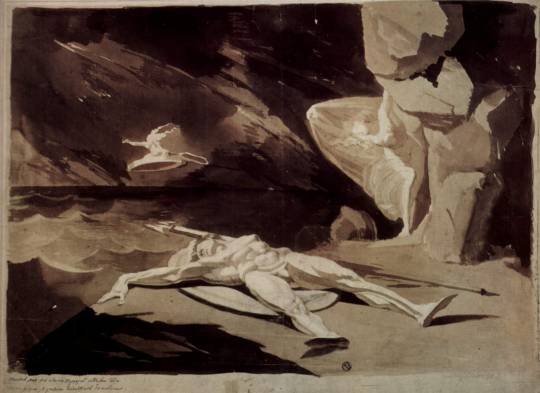

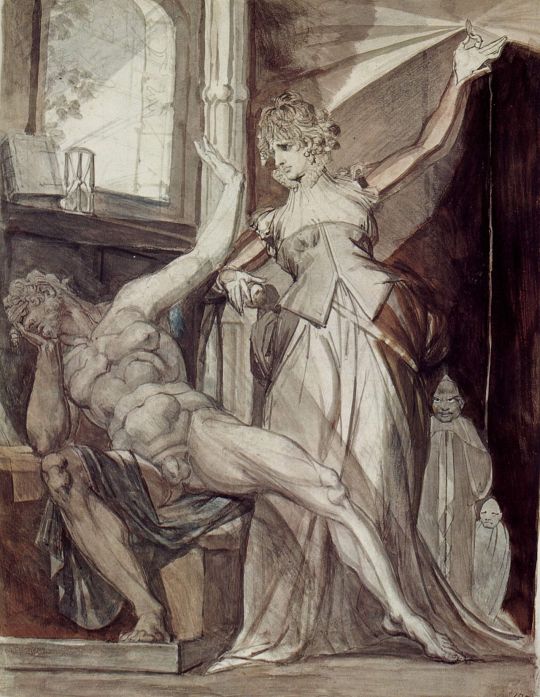
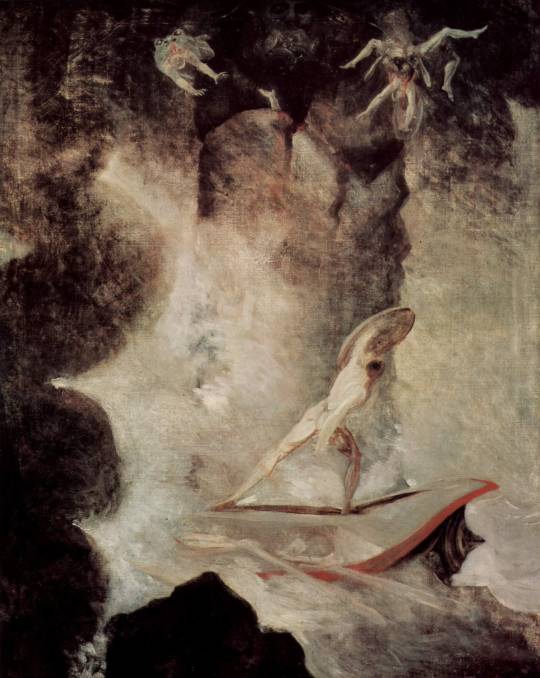
“Art, like love, excludes all competition and absorbs the man.”
- Henry Fuseli
#henry fuseli#art#artwork#classical art#sturm und drang#art movement#something about this colour palette and the melancholy of it all#kinda detached from the happenings#reminding us that we are mere powerless spectators#also of snapshots frozen in perpetuity causing more grief as the subjects can never move forwards#his titles are bangers though lol#the song of achilles#tsoa#greek#greek myths
242 notes
·
View notes
Note
When I was a kid, I read a lot of books by Bruce Coville, a kid's sci-fi writer who wrote books about alien children and human children who went on adventures together. He managed to get nonbinary representation in his books and on shelves in the 90's, which I really appreciate. So it'd be neat to kind of use that as a prompt and have a nonbinary human and alien who've been friends since they were kids and the alien was the first non-human transfer student in their class, and now that both of them are adults they realize how much they love one another. Best friends to lovers, and the only weird thing is that it took them so long to realize it. (Bruce Coville wrote a lot of different kinds of aliens - plant-creatures, bug-people, multi-armed people in every hue of the rainbow - so you can get as creative as you want with the alien design and it'd be true to the spirit of his works.)

Male Alien/Nonbinary Reader
SFW
Wordcount: 1,023
Commissions | Ko-fi | Masterlist

The grass had tickled your back as you lay next to Xyllin, your childhood companion and closest confidant. His grand form had been comforting beside you, a reliable rock in a constantly shifting world. He had gazed up at the night sky, eyes twinkling with the reflections of distant stars.
"The stars on Earth... they're beautiful," he had commented, his voice carrying a hint of melancholy. On his homeworld, the stars were too distant to admire.
You had followed his gaze to the vast inky expanse, scattered with tiny glimmers of light. The tranquillity of the moment had washed over you, leaving behind a soothing silence. The world had felt still, as if it was holding its breath.
"Can you tell me," Xyllin had started, interrupting the calm, "what is human romance like?"
His question had caught you off guard. Your heart had stuttered in your chest, tripping over beats it had once known so well. The stars above seemed to grow brighter, the night chill felt a bit sharper; and Xyllin, he felt closer than ever. It was a simple question, perhaps for him, but for you, it was a door opening to a realm of possibilities you had secretly hoped for. The answer you had given could change everything between you, and you had found yourself both terrified and excited by the promise that held.
"Human romance," you began, grappling for words to convey the concept accurately, "it's quite diverse, really."
You took a moment, drawing on your knowledge of Xyllin's species. Their relationships, as he had once described, were primarily transactional, arranged for pragmatic reasons rather than emotional ones.
"Think of it like a seed," you suggested, turning your gaze from the stars to his curious black eyes. "Sometimes, two humans meet, and they plant this seed together, intentionally. They call this dating or courtship, nurturing the seed with shared experiences, common interests, all that stuff."
A gentle breeze stirred the leaves around you, rustling in the quiet of the night. Xyllin remained silent, his focus entirely on you.
Encouraged, you continued, "sometimes, that seed is planted unknowingly. It may lie dormant for a while, and then, under the right conditions, it starts to grow. This often happens between friends. They share moments and memories, and one day, they realise there's something more—something deep and profound that wasn't there before."
You had paused, your heartbeat pounding in your ears. You didn't tell him this was precisely how you had come to feel about him. That your seed of friendship had bloomed into love. That was a story for another time, another starlit night. For that moment, you were content laying there with him, sharing whispers under the cosmos.
Xyllin's soft blue scales reflected the moonlight, a palette of speckled colours that looked utterly ethereal. His six arms, though often seen as intimidating by others, had always felt comforting to you. They conveyed a strength and gentleness that was simply... Xyllin. His eyes, those deep black pools of cosmic curiosity, were earnest and open as he digested your explanation of human romance.
After a moment, he had broken the silence. "What you have just described," he started, his voice quiet but carrying in the stillness, "feels precisely how I feel about you."
The words hung in the air, stirring echoes in the silent night. Your heart missed another beat, your breath hitching in your chest. You turned to look at him, his large form illuminated by the soft glow of the moon. His face was unreadable, yet his eyes held a vulnerability that tugged at your heartstrings.
He loved you. The realisation had washed over you like a wave, filling you with warmth and a sense of wonder. A tide of emotions had surged within you, but amidst the maelstrom, one feeling stood out - joy. Pure, unadulterated joy.
Slowly, you reached out, touching your hand to his. His skin was cool to the touch, a gentle contrast to the warmth spreading through you. His fingers curled around yours, a comforting weight that grounded you to the moment.
You looked into his eyes then, lost in the depth of his gaze, and whispered, "I feel the same, Xyllin."
With your hand in his, you drew in a deep breath, the scent of dew-covered grass filling your senses. "Xyllin," you whispered, your voice barely audible over the chirping of distant insects, "I've loved you for a long time."
He looked at you, his deep black eyes wide in surprise, yet glittering with a hopeful curiosity.
"I've loved you since we were kids," you confessed, a flood of memories washing over you. The first time you'd seen him, he had shuffled awkwardly through the classroom door. He was an oddity, an alien, taller and broader than any of the human children. Yet he had exuded a gentleness that had drawn you and the others towards him.
"I've been the lucky one," you continued, your voice gaining confidence. "You chose me as your best friend."
Emotion swelled within you then, a wave too strong to be held back. You moved closer to him, your heart pounding in your chest. His eyes never left yours, and in their depths, you saw a similar emotion mirrored back at you.
Then you'd kissed him. It was a gentle press of lips, a silent confession of years of longing and affection. His lips were cool, and he'd tasted faintly of the sea, a hint of his aquatic origins. It was different, and yet so right.
Pulling away, you'd searched his face for any signs of discomfort, but all you had seen was the same affection you'd always known, now intensified by the admission of love. The confession had felt like a sigh of relief, a release of a truth held too long.
Underneath the vast night sky, the quiet sounds of the night acting as your serenade, the two of you had found a new depth to your relationship. An understanding beyond friendship, a connection rooted in love. This was your moment, your turning point, and it was just as beautiful as the galaxy of stars above.
#exophilia fiction#monster x reader#monster romance#monster boyfriend#tag: nbxm#tag: male monster#tag: nonbinary reader#tag: alien#tag: sfw
54 notes
·
View notes
Text
2022 Year End List - #6
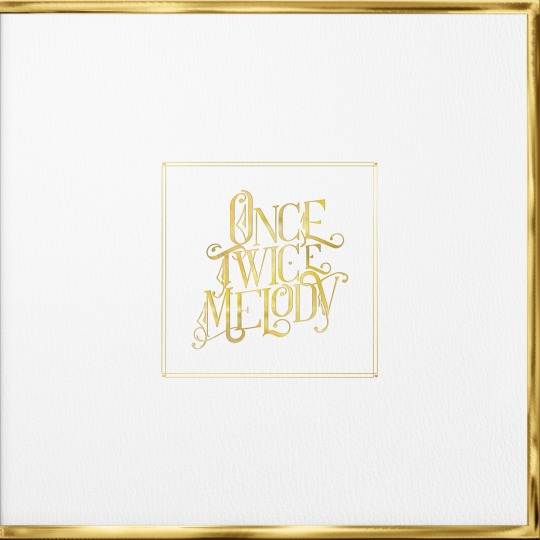
Once Twice Melody - Beach House
Main Genres: Dream Pop, Indie Pop, Neo-Psychedelia
A decent sampling of: Ethereal Wave, Synth Pop, Shoegaze, Indietronica
Can’t believe that it’s taken me this long to do a Beach House review. I mean, just look at the record I’m holding in my profile pic. It’s about damn time, I’ll say.
For those not in the know, Beach House are a dream pop duo based out of Baltimore, Maryland. There is guitarist Alex Scally and vocalist/keyboardist Victoria Legrand, both primary songwriters.
Beach House is known for largely leading the wave of renewed interest in dream pop amongst a whole new generation in the 2010s, and it’s safe to say that they’re probably one of the three or four biggest names in indie rock of the last decade. Hell, there’s footage on YouTube of frigging Beyoncé and Jay Z vibing in the audience at one of their shows at Coachella.
Beach House’s typical sound is marked by the following: warm retro organs, slide guitars, minimalist drum machine beats, a generous amount of reverb, Legrand’s earthy but soft contralto vocals, poignant and sentimental lyrics, and of course, major viiiiiiiiiiiiiiiiiiiiiiiiibes.
Alex and Victoria are notable as artists for their clear dedication to developing their signature sound organically, opting to explore new avenues of their sonic palette here and there rather than reinventing themselves entirely. Yes, the essential components and formula of the Beach House record have remained largely the same from the band’s self-titled debut all the way up until now. Yet, at the same time, the band has evolved in a multitude of ways, and each of their albums manages to sound quite distinct from each other despite maintaining similar base elements.
I, for one, really admire that Beach House treats their albums more like different expressions of a persisting musical approach, like an artist using the same paint brush and many of the same colours to create very different paintings. Using their essential components, Beach House have created records that range anywhere in sound from the expansive, youthful wanderlust of Teen Dream to the cozy, elegant melancholy of Depression Cherry and the cool, hypnotic twilight of 7.
I also greatly admire the firm stance that Alex and Victoria have taken in that they will continue to make the music that they love, exactly as they would like to, largely removed from the context of their time. It helps that the band has a very loyal following, and as an aside, are generally some of the coolest people you will ever meet.
But I digress. What to make of their latest record? Well...
Once Twice Melody is the most ornate, maximalist, and monumental album of Beach House’s discography thus far. The record takes on a distinctly fairytale aesthetic, with glittering, majestic arpeggios and glissandos, more string arrangements than the band has ever previously incorporated, and a sense of regal polish that defines the mastering and production. The album is divided into (and was released as) four separate 'chapters', much like a storybook. This is probably why it is also Beach House’s longest record to date, almost 1.5 times as long as their next longest record Bloom.
Chapter one opens with the title track "Once Twice Melody", which heralds the beginning of an enchanting dream, with prancing chimes that dance around like flashing colours behind closed eyes. It becomes immediately apparent that Beach House are looking to deliver something more mythical and epic on this record, and “Once Twice Melody” more than exceeds in setting that tone.
If Beach House’s now-signature "Space Song" off of Depression Cherry was a song fixed among the stars and floating in tranquility, then Once Twice Melody's “Superstar” is a rocket preparing for blast off, with all of the necessary fanfare in the form of arena rock melodies, exuberant orchestral strings, and a soaring bridge that leads into a gravity-defying outro. It is the most massive sound the band has yet achieved, beating out even “10 Mile Stereo” and “Irene” in its sheer sonic magnitude.
“Pink Funeral” is an unearthly paradise of a song, like watching a rain of shooting stars turn into colourful puffy smoke clouds. The whole thing washes over the listener in a beautiful unicorn shade of neo-psychedelia.
Chapter two features “ESP” as a slow, teary-eyed dream pop serenade with earnest strings, cushiony in sound and immaculately compassionate in its atmosphere, as if trying to alleviate all the misunderstandings in life. Victoria Legrand demonstrates her knack for imparting simple truths with the simple but brilliant lyrical motif “What everybody knows / Not everybody shows”. Another one of the highest highs on the record.
Marked by a fluffy feel-good melody, bright sparkly synths, and a steady hi-hat drum machine beat, “New Romance” is essentially a lost Bloom track. I don’t mean this in a bad way, mind you; it’s actually one of the best cuts off the album, and it makes feel incredibly nostalgic for the summer when I first started listening to Beach House.
Chapter three’s greatest highlight is “Masquerade", a dark and dreamy labyrinth of electronic ethereal wave. Very cool sci-fi-meets-gothic sound, not entirely unlike a Depeche Mode song. Somewhat of an occult anthem for a mysterious, morally ambiguous heroine, and I absolutely love it.
The final fourth chapter and record itself closes with “Modern Love Stories”, a cinematic and flourishing dream pop ballad that climaxes, and then dissolves into an acoustic guitar melody that flies off into the night sky of an open desert highway. I could (and will) point out that it gives off quite a similar impression as an album closer to 7′s “Last Ride”, albeit with a much less depressing, more uplifting spirit. Either way, it’s still gorgeous in its own right, and “Last Ride” remains my favourite Beach House closer, so I'm more than happy that they did it again.
As for my one real critique of the record, all I can say is this: Front. Loaded. Chapters one and two are significantly more consistent than chapters three and four. Then again, I can’t say I would prefer the album to be edited down; the whole point of this record is clearly that it is meant to be Beach House’s ginormous opus album, and I appreciate the concept and wouldn’t want to change that.
And this is still Beach House we’re talking about, a band who outmatches about 99% of all bands when it comes to consistent quality. Likewise, talking about the consistency between tracks on a Beach House record is really like splitting hairs at the end of the day, although its frontloadedness is still plainly noticeable to me.
Regardless, I will always be thrilled for another new Beach House record. This might not really even be my second or third favourite project by them, but Once Twice Melody must be acknowledged for the landmark album that it has become in the band’s discography. It is great to see that eight albums in, Alex and Victoria are feeling more adventurous than ever before. A highly recommended listen for anyone looking to lose themselves in a lush fantasy world.
9/10
Highlights: “Superstar”, “ESP”, "Pink Funeral", “New Romance”, “Masquerade”, "Once Twice Melody", “Modern Love Stories”, “Runaway”, “Through Me”, “Sunset”, “Many Nights”
#beach house#once twice melody#indie pop#dream pop#neo-psychedelia#2022#aoty#list#year end list#best music#album review#music review
3 notes
·
View notes
Text
Of a limited emotional spectrum
Being a middle-aged white guy it is entirely predictable that I listen to white guys making predictable white-guy music: and while I could make some faux-apology for my cultural straitjacket, it’d be both disingenuous and very, very deceitful.
And it is the same with my emotional expression and range -- the MAWGuy emotes alone, privately, unseen: it’s a tortuous process involving massive facial contortions in the vain attempt to un-emote, to stay strong, impassive, calm and rational. And so we life live elegiacally, drawing sorrow and feeling from events long passed and, ironically, manage to let pass that which is happening in the here and now..............it’s pretty fucking self-indulgent and, broadly, dumb.
Effectively we draw our feelings from what has occurred, from events which have been processed, sanitised and are now recycled for our own melancholy consumption. It’s how we’ve been trained, it’s all we know, it’s all pretty cold-hearted and Nordic.
We substitute: steadfast instead of volatile, thoughtful instead headstrong, empathetic instead of irrationally sympathetic -- it makes for a pretty mute emotional palette.
And so it with the music I listen to -- complex, long ballads, replete with rhythm changes, long sections of minor drones punctuated by the odd melodious stanza, meticulous, precise. It reflects how we experience the world.
Of course, ever since you exploded into my life things have changed: but, fuck me, has it taken along time: when you have spent your entire life straying only marginally from cold-hearted anything vaguely more colourful, warm and genuine feels genuinely scary -- the result: total mindfuck-flip and we become unanchored, unguided missiles, intense and scary. Make sure you this is the individual you avoid-at-all costs......my advice: RUN.
You did. Rightly.
In some cases us MAWGuys then manage to right our capsized vessel and begin the arduous task of hosing the water from within and slowly, imperceptibly, our hull floats higher till, eventually, it resembles something which bobs atop the sea...........
And here’s where the contradictions manifest themselves even more acutely: while our ubermensch shell might have been cracked open our ability to think what we say remains stunted, bordering on the mute........after all, to emote is to be capricious, reactionary and potentially, irrational: it’s a hard act to ditch.
In my case I resort to lyrics and I believe -- nay hope -- that you will read into them what I do...........pretty unlikely actually, but such is the MAWGuy brain wired. But let me try different.........
I worry. I worry about you. Not for me, but for you. When things get overwrought, too intense and overwhelming, you resort to sleep, me to song........
Close your eyes
Don't be afraid
I'm with you
This place is safe
We found a camp
We have supplies
They will let us stay the night.........
Don’t run. I have no idea why, but I know things will be ok.
0 notes
Text
Character Design (part 2)
Category:- Research and Planning
Vivan- He is a shy introverted guy. He really finds it hard and stressful to socialise with people and so tends to be by himself a lot. You can see these in his manners when new people like Isha in the first scene come to sit beside him he distances himself and turns in the other direction. He’s also very misunderstood by people at his college. People there don’t know a lot about him they tend to think of him as someone who is creepy and shady and while he does ignore these comments they do sometimes get to him and are like a soft spot for him. while he says and acts like he doesn’t want friends, it’s quite the opposite, he is lonely and does crave any form of companionship. That’s why when Isha talks to him, stands up for him to her friend and also invites him to dance with her he falls head over heels for her. given that he doesn’t have a lot of social interactions he takes her simple actions as love asks her out. Because he is so head over heels for her he asks he out more publically and that is sort of his way of proving his love for her by pushing himself to do something hard for him. It was his way of saying look how much I love you, that I’m even pushing myself to do something that I have been scared of practically my whole life. And when he does get rejected he feels like he’s been betrayed and played. he feels like his whole world is shattered as that one person, the only one who looked at him and took initiative to talk to him and know him is now abandoning him. At this moment he feels a bunch of emotions its a blend of feeling abandoned, betrayed, played with and ridiculed when Isha brings up his insecurities. All of this comes out as anger. For his colour palette, Rutvi and I choose black and shades of blue. Black symbolises mystery and also is a colour that doesn’t gather a lot of attention so it fits his introverted personality the best. He starts wearing blue after he meets her and blue represents calmness and relaxation. We used different shades of blue going from dark to light to show the change in his mood and character after each of their encounters. He goes back to the black ones she rejects him. I wanted his outfits to emote feelings as well so this subtle shit was very important for us. Vivan means full of life which is very contradictory to his deep quiet and melancholy personality(we thought to continue with sarcasm with the meaning of their names).
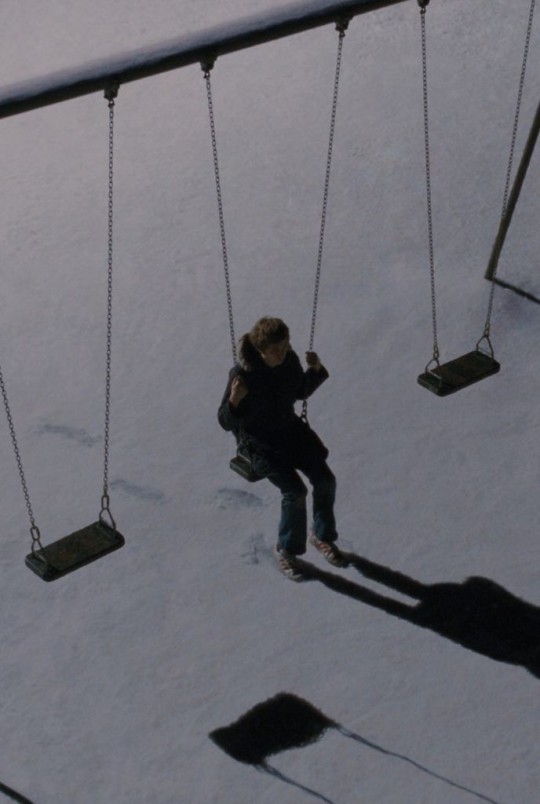
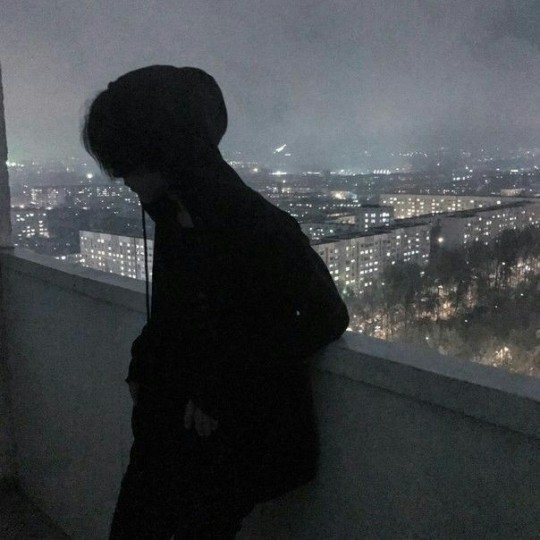
The link below is for the playlist I created for vivan:
https://open.spotify.com/playlist/6AWyGjq8UYb3tGLw4NktHJ?si=bf10e6ae085a4238
Khushi- Her name means joy, and happiness and has a youthful feel to her name and that’s exactly how she is(no jokes here). She is someone that is who gets attached to people very quickly and will do anything and everything for her friends. She considers Isha as one of her best friends and thinks of Vivan as a danger almost. Given her caring personality, she will always warn Isha about vivan. She has a very extroverted sunshine golden retriever personality that can make you smile just by looking at her. She is the most loyal friend one can find and she will be someone who will always protect her friends.
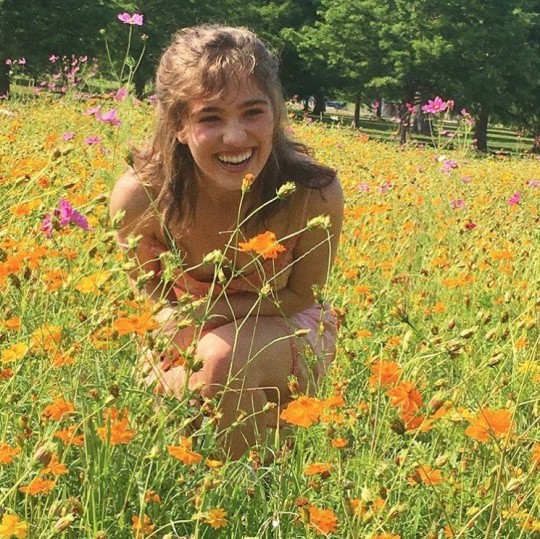
The link below is for the playlist I created for Khushi:
https://open.spotify.com/playlist/57GFfu50qoqc081b19Pq32?si=d99416b3e14242fb
0 notes
Text
"Here comes the sun" Blaise Zabini x Theodore Nott
Muggle, retro au
@lifesucksandiwanttobeamarauder I finally translate that fanfiction, I hope you like it 🥺
The dark-skinned boy has tried to sit still from three hours already. It is incredibly hard for him, because of his amazing hyperactivity. In all honesty, sitting here as a model doesn't count to his dreams or favourites activities but he couldn't deny to Theodore's asks.
Just because of that — his bloody weakness for the older boy — he must stick up there and pose to Theodore's new painting. Blaise perfectly knows that person on that work of art won't be even similar to him. But it will be beautiful, perfect as everything that has been made by gifted hands of Theodore Nott.
There's music, playing quietly at the background, played on a gramophone, restored by Blaise himself. He gifted it to his friend as a birthday present two years ago on an incredibly warm and short night, 22th of June.
He has so many memories with that slight, passionate boy.
"Theo," he says suddenly, breaking the silence. He sounds like a dissatisfied kitten and when he doesn't notice any reaction, he repeats meowing "Theo, I'm bored."
The other boy finally pays his attention to Blaise, not his reflection on painting, which is created on a canvas (too small in Theo's opinion).
"Blaise, you really can't stand it for a while more?" Theodore asks and there is a nuance of desperation and melancholy in his voice, "I want to end it."
And Blaise has already known, he loses again. He won't be able to deny his friend the pleasure that results from looking at the painting — finished, after hours of working.
"I'll stand it, Theo" he sighs and in his mind adds 'always for you'. At this moment all he can do is begging and praying that Theodore is not able to read minds, just like some characters in their favourites comics.
"Nah, Blaise" slight boy says suddenly and leaves his paint palette and set of brushes on the cupboard, promising himself that he will wash it carefully within a few minutes when paints won't be already dry "I know you don't want to."
"It's not like that" Zabini starts to explaining himself chaotically because he doesn't want hurt Theodore's feelings, "I love watching your painting and you while you're painting. And I love that you have a passion and you're so talented. I just... It's May Day and we are sitting in your room..."
"It's alright, Blaise" Theodore interrupts his with the most beautiful, in Zabini's opinion, smile — that carefree, happy and only a little faraway one.
"We should do something and bring Hope with us to take many photos and place them in our albums with dumb yet cute captions" Theo proposes with a light laugh.
The younger, but taller, better built and more mature, of boys, stands up and brushes off invisible pollen from clothes. He reaches his hand to Theodore to help him stand up.
"Wanna go?" he proposes and even if Theo doesn't know where he agrees without a single question.
It doesn't matter where they go, it will be awesome as always if Blaise is with him.
He catches Hope and puts it on his neck. Theo loves his polaroid camera with whole his heart, even if it isn't the newest and all the better photos were made by Blaise.
Blaise is still holding Theodore's hand in his (definitely larger and rougher), like he doesn't care about rubs of paints in many different colours on Theo's hand and now, also on Blaise's one.
He pulls his friends outside and enters the garage like he is in his own house. Theodore knows what he means without words and grabs his bicycle with a big smile on his slim face.
Meanwhile, Blaise grabs his skateboard, which, only in the form of rebellion against sentiment, he did not give a name. But he perfectly knows that by his skateboard, people could see a different side of his personality, which he doesn't show often — bloody sentimentalist who loves very clichéd books or movies and constantly remembering beautiful moments, and it doesn't matter if that happens a year ago or two hours ago.
The skateboard has its best years far behind its. The picture which was printed on the underside of 'his love' (although, of course, incomparable to that of the boy just standing next to him) has almost completely faded and crumbled, peeling paint seems not so good, to put it mildly, but in Blaise's opinion, it adds the special character and charm to his skateboard. Every scratch and every cooked screw tell a story and Blaise thinks it definitely better than new skateboard — probably glamorous but without its own character.
Blaise isn't similar to Theo, not it that topic. He has never had boxes filled with various craps, which refer to many different events and happenings. He doesn't have special notebooks with tickets, a diary or millions of notes with quick sketches, created under the influence of a sudden flow of wen. He doesn't keep every notes and message on scraps of papers, which have been hand down on lessons, in hope that the teacher wouldn't see that. In first, even having a photo album was strange for Blaise. It shows, that he likes looking back at past and that feeling, which sometimes accompanies you right before falling asleep, when you remind yourself one of those pleasant situations from childhood, isn't foreign for him. It was all he was trying to defend himself against, but only for a time.
For a time when on his way stood that quite frail and nerdy boy. Theodore showed him being sentiment isn't something bad just as singing songs out loud in public places. As compensation, Blaise showed him the magic of comics and all these beautiful, charming in their area, which he discovered while taking a walk daily. Blaise pulled Theodore out of his room and dragged him away from the easel to lead him everywhere he can.
"To our place?" Theodore asks and gets on his a little too small, colourful bike. The seat creaks quietly under his mass but none of the boys pays any attention to this.
"Exactly, now ride, my carriage" Blaise screams and catches up on Theo's seat so the movement of the bicycle can drag him.
"Pff, flax" Nott giggles and Blaise find it as the most sonorous, melodic sound in the whole world.
They ride slowly through all that musty hole, also known as Torquay, or — their home. The road even if it's really old and it remembers when they as children drew chalk on a street, is not in a bad condition. A worse fate befell the road signs — some of them are smeared with sprays, and some are knocked off the ground, due to a car accident or a group of probably drunk but still strong young people.
There are many houses near the road. They are quite poor and definitely not as modern as houses in the capital. At some time, before he started taking daily walks, Blaise dreamed about living in London. Or rather, to be able to tell others that he lives in London. It's another thing which distinguishes him from Theodore — the older boy sees beauty everywhere, in everything and in everybody. Blaise envied him with this skill, for him the world has been boring or just ugly and people have been cruel sometimes.
The sun is warming their backs when they slowly ride on a well-known path. They pass Mrs Shermik, so out of courtesy from four meters away from her, they shout to the old woman joyful 'Good morning'. As they turn into a lane, which is fortunately dry as it hasn't rained much lately, Theo starts humming under his breath.
"Hey Jude, don't make it bad" he looks at his friend (nearly losing control of his bike) and Blaise quickly understands what he means.
Blaise joins to his singing and adds next line:
"Take a sad song and make it better".
Someday Blaise would have worried. He was worried about what people would think, he was afraid someone would hear them. But not now. Now he doesn't care when the words flowing from the depths of memory, and when the song ends, he starts another, definitely his favourite — "Blackbird". Neither of the boys has a perfect voice, singing is definitely not their hidden talent, but that doesn't matter. And that is wonderful, isn't it?
Here Blaise can no longer skate further — the ground is too uneven, even ploughed by the tires of wheelbarrows and carts of people from the neighbouring village. The dark-skinned man rejects Theo's offer to simply get his bike's rack and chooses to run next to the boy. The basketball team and two trainings a week are finally coming in handy — thanks to this, his condition is really good and he doesn't gasp like an old man with asthma after twenty meters run. Theodore, noticing how well his best friend is doing, accelerates, forcing Zabini to run, which he accepts with a groan. Nevertheless, he catches up with the older boy and promises himself that as soon as they get there, he will get his revenge.
After five more minutes, they are a destination of their travel. The place they describe as "their", although they are well aware that they are not the only people who come here, is exactly as they remember it — beautiful.
It was Blaise who discovered them during one of his walks over three years ago. He perfectly remembered how it happened.
That day he was trying to find a rather fast but shallow brook, which he remembered from his childhood. Before Draco's move to London, they told Draco's parents that they were going to the field, but in fact, they went to the brook and walked back and forth on a tree that had fallen over the river. He remembered just as well how Draco's mother, on her way to the store, noticed they were not on the field, prompting a search. When their parents found them by the brook — wet but in unusually good moods, they were already too worried to be upset with them.
After searching for more than an hour (during which he definitely fulfilled the daily, maybe even a week, step norm, but he didn't care) he found a place from his memories, although it was difficult to recognize its. The brook had dried up completely, leaving only a faint riverbed and tree roots washed out of the ground, but the place has definitely retained its charm.
Theo drops the bicycle, leaning it hurriedly against one of the roots, and lays down on the grass, staring at the almost cloudless sky, hidden only by tree branches. Blaise, slightly out of breath, rests his hands on his knees and stays like this for a moment. When his breath normalized he comes closer to Theodore. There is a snap and a Polaroid camera gracefully named Hope spits out a photo in which the image hasn't shown up yet. Theo enthusiastically grabs a small piece of paper and starts waving it so fast that it is about to reach orbital velocity. After a while, the picture clears up the silhouette of a younger boy, who was about to lie down next to his friend. Blaise looks at the photo and asks smiling, even though he already knows the answer:
"For your or my album?"
"Of course mine," Theodore replies quickly, grinning happily, "Why do you need your own photos? They will be much more useful to me."
The dark-skinned boy can't help but messes Theodore's hair in one move of his hand. However, Theo is not annoyed by that, he reacts to it like a cat, moving closer and silently demanding further caresses, which the younger one does willingly.
They are sitting like that (or rather, Blaise is sitting and Theo's half lying on him) till the sunset. There is a flower crown on Blaise's head, made by Theo with field flowers collected by him. And of course, Theodore took a photo of Blaise in his work of art.
It's getting dark. Butterflies, which were flying around them flew away and gave way for beautiful moths and fireflies. Theodore stands up energetically and starts jumping on protruding trees' roots, chasing insects to take a photo of them.
"Theo, please be careful," Blaise says attentively but the only response is 'don't worry' screamed by Nott.
Blaise unwillingly starts remembering his childhood. Times, when he wasn't Theodore's friend and all that connected them, was the same neighbourhood, chalk and short-term relationship of their parents. Then they found that as a stupid and loathsome. Nowadays, at their seventeen's, just as weird. But they weren't friends. After all, Blaise was friends with Draco and the teacher in primary had repeated that it's better to have fewer friends but true friends. So Blaise fraternizes with Malfoy till he moved to London.
It's not that now Blaise finds it as a mistake or holds any grudge with Draco. But nowadays he thinks that it is not good to withdraw from others.
When Draco had left and moved to London, Blaise had thought they now he stayed alone but on that moment, Theodore slowly crept into his life. Nott sat next to Blaise on school basketball pitch and started reminding happy moments from times when Draco lived in Torquey.
And later he showed his painting to Blaise and dark-skinned boy couldn't believe someone his age could do something that beautiful. A week later Blaise sat down with him in the canteen and sometime later also on most of the lessons so he could distract him from learning to read their favourites comics.
Now, Blaise would imagine his life without his always laughing and only sometimes a little faraway friend.
His thoughts are interrupted by a quiet scream.
"Ouch!"
Blaise, worried, stands up imminently and run through Theo. He is curled up in a fetal position between roods of the biggest tree. Zabini hugs him tightly and Theodore accepts that willing, cuddling to his chest while holds back tears.
"Ah, Theo" Blaise whispers, still cuddling the boy in his arms, "I asked you to be careful."
"I'm sorry, Blaise" he answers, sniffing.
"Don't apologize to me, silly" Blaise couldn't stop himself from nuzzling his friend's cheek.
"But you are worrying now and you warned me that I might get hurt..."
"Shhhh" Zabini interrupts him and places his fingers on Theo's mouth to shushes him "I always worrying about you, no matter if you get hurt or not" he admits truthfully and after a few seconds of silence adds "Please, stop crying.
He stops hugging Theodore, although he wants to do it forever. Blaise squats in from of him and gently grabs his friend's head. He wipes away tears, flowing slowly on fairy (although all that time, spends under the sunlight) skin.
He wants to not cry because of sadness or pain, wants him not to have reasons for a cry.
He wants him to be always happy, even if that meant that Blaise wouldn't be on his side.
Wants, wants, wants.
But the world isn't always beautiful, even if Theodore thinks so. Sometimes the world is cruel, ugly or just totally boring. The same about people who live in it.
Do it's really important to find your refuge. A place, a person or a hobby, which will be like an escape from all evils in that world.
Blaise thought that his escape is comics. Reading them has dragged him into the world of superheroes where he could use his imagination and think about meaningless things for hours such as what superpower would he choose (flying, of course). Besides that, the world in comics is just easier. It isn't hard to differentiate who is good and who's bad. Good people fight with bad people, that's all. The Justice League cares about Gotham and saves innocent people from Joker, Deadshot or Darkseid. In the real world, it would be an unsolvable matter with billions different threads and complications so even the best detectives wouldn't be able to decide who is guilty.
Comics world is just easier.
Lately, Blaise has got to understand that the whole beauty in that world is locked in its confusions, problems and ambiguities. Because the world is beautiful, even if sometimes it's cruel or ugly.
And the one who made him understand that is his only real refuge — Theodore Nott.
He is the one who makes reading comics even better.
He is the one with who Blaise could do anything and it would be incredibly good.
He is the one with who Blaise wants to talk about 'good old times' and makes new memories to remember.
He is the one with who Blaise wants to stay forever.
Theodore Nott is the one who Blaise bestow that hot and unique feeling which, no matter what since says, comes from the heart.
And that feeling, now makes him do something, he has been dreaming about for that long. Blaise gently and unsurely grabs the head of the person, who since a year isn't only a friend for him. He delicately raises Theo's head a bit upper to look him straight into his eyes. Their lips touch slowly and gently. Both of them don't feel so confident with what's going on but they will worry about that later. Now, Blaise doesn't have the time and desire to thinks about the consequences. Not now, when he feels the structure of soft lips of his love.
When the dark-skinned boy doesn't notice any objections from the older boy, he let himself do a light, carefully move with his lips. He doesn't want to scared Theodore, knowing how delicate and artsy person he is. He would ever forgive himself hurting Theo.
If he only knew how long Theodore was waiting for it and how much he enjoys that kiss, even if Blaise's lips are rough and chapped.
Blaise gently moves away and hangs his head down, looking at too long grass. He's afraid of seeing Theodore's reaction for what he has done because he's afraid of rejection and ending that important relationship.
However, Theo, likes he doesn't see his friend insecure, giggles lightly and grabs the younger boy cheeks, turning his face to him.
"Oh, finally. How long might I wait?" Theo says with a delightful smile.
"Really. You... Me..." Blaise mutters like he doesn't know what he wants to say.
"Yeah, silly" Theo chucked and hits an end of Blaise's nose with his "You're definitely my favourite person in that universe. And every other, alternative universe too."
Blaise, still can't believe what's happening, hugs his boy and kisses him quickly. The kiss is one hundred per cent cute and totally not sultry. Because feelings as sultry and desire don't fit Theodore, even in an alternative universe where Bruce Wayne become the Devastator instead of Batman. It just does not fit.
"Yeah, and you're my fav person."
They sit in silence for a while, but it's nothing wrong. The silent can be calming and comfortable, it can say more than every word in the world.
The air is getting cooler and owls' chirps become more ominous, so finally, Blaise breaks the silence and says:
"Theo" mentioned boy turns to him and glance at Zabini, "Is your knee still hurting?"
"It's not that bad" Theo shrugs but Blaise quickly understands that it's not good either, "But can you ride the bicycle? I'll drive on its carrier."
"But what with my skateboard?" Blaise asks inconvenience.
"I'll carry it, please" Zabini's only answer is a sigh but not the irritated one. He doesn't know what would Theo had to do to irritate him.
"Alright, but please, be careful."
Blaise raises Theo's bicycle from the ground and helps the boy to climb up to the luggage carrier and then he carefully sits on its seat. Theodore holds Blaise's skateboard (which he has named against his will — Faith) with one hand and the other one is embraced around Blaise's stomach so Theo can stably stay on the carrier. Well, maybe not only because of that.
"To me?" Blaise proposes and slowly leaves their place.
Theodore automatically nods but then he understands that Blaise can't see him so he quickly says 'yes' some times.
Boys are leaving, slowly and without unnecessary haste, but that moment is different than every previous one, they have spent here. Now, they're leaving their place not as just friends.
From Theodore Nott's album:
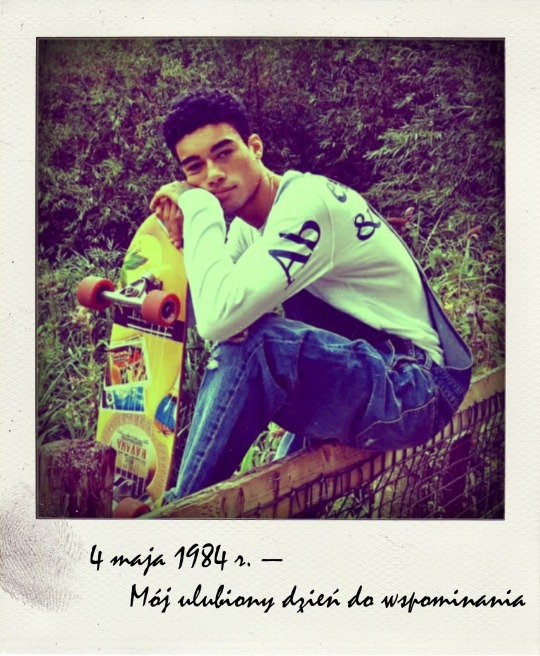
"4th of May, 1984 —
My favourite day to remember"
#harry potter#slytherin quidditch#bxb#slytherin quidditch team#blaise x theo#blaise zabini#theodore nott#zabini x nott#mrs zabini#muggle au#non magic au#retro#retro au#slytherin#slytherins#slytherin quartet#draco malfoy
33 notes
·
View notes
Video
youtube
Do you “fucking love” science? Have you ever been blinded by it? Well, it doesn’t really matter, because that goofy little number isn’t really supposed to be on Thomas Dolby’s debut album in the first place. Find out about all the awesome OTHER stuff that’s actually meant to be here, in this new installment of Great Albums! Transcript below the break.
Welcome to Passionate Reply, and welcome to Great Albums! Today, I’ll be talking about a stellar album by one of those artists who have gone down in history as “one hit wonders,” despite producing a deep catalogue that’s often more impressive than that one song they end up known for: it’s The Golden Age of Wireless, the debut LP of Thomas Dolby. Chances are pretty good you’ve heard his big hit, “She Blinded Me With Science,” before...at least, if you’re American.
Music: “She Blinded Me With Science”
Like I said, if you’re American, you’ve heard this one before. If anything, it’s oversaturated! But if you’re from elsewhere in the world, you might not know it. Growing up in the US, I went through the whole gauntlet of alleged “one hit wonders” of 80s synth-pop, and a great many of them turned out to be British artists who had perfectly respectable careers in their native UK: Gary Numan, Soft Cell, and OMD, for example. Thomas Dolby is also British, but he’s apparently more famous here than he is across the pond--which is still not that famous.
He really ought to be, though, because The Golden Age of Wireless is a true masterpiece. Or, at least it WAS, in its original form. It’s actually a tough album to talk about, insofar as it’s hard to pin down what exactly constitutes “The Golden Age of Wireless.” It’s had quite a few different pressings, and a variety of different track listings. And the original version of it does NOT include “She Blinded Me With Science.” While I’d never argue that it’s a bad song, since it is insanely fun, and catchy to the point of being irresistible, it really does not belong on this album. I’m sure it helped them move copies of it, but its inclusion kind of ruins the vibe, to be honest. Its in-your-face and flamboyant hooks make it feel like a very unwarranted intrusion on an otherwise fairly serious and contemplative LP, which seems to have been intended as a fairly tight and thoughtful concept album.
Aside from that glaring issue, there are a few other tracks that have appeared on later versions of the album that weren’t there from the start, namely, the two tracks from Dolby’s first ever-release, a double A-side of “Urges” and “Leipzig,” as well as “One of Our Submarines,” the B-side of some versions of “She Blinded Me With Science.” All of these tracks are excellent, and mesh with the thematic and sonic character of the album quite well. “One of Our Submarines” in particular is often considered one of the best tracks of Dolby’s career--melancholy, claustrophobic, and stinging in its poignant sense of tragedy. It captures the misery and futility of modern war, as well as the sunset of the British Empire after the Second World War...and there’s a sample of a dolphin, too. It’s easily the track that I most wish had been included from the very start.
Music: “One of Our Submarines”
But now that that’s over with, I’d like to drill down and talk about how the album operates in its original form, as the artist intended. Like I said earlier, The Golden Age of Wireless is best understood as a concept album, and I think of it in a similar league as classics like the Buggles’ The Age of Plastic, OMD’s Dazzle Ships, or even Kate Bush’s Hounds of Love. The original track listing opens with “Flying North,” a stellar introduction to one of the most prominent themes of the album: freedom!
Music: “Flying North”
“Flying North” is an exultant anthem of self-determination, and one clearly mediated by “metal birds”--aeroplanes, that is. It’s a celebration of the independence allowed by technology, and a rather winsome one, in which this almost macho image of a heroic pilot takes center stage. The final track of the album, “Cloudburst At Shingle Street,” is a bit more esoteric, but seems to be aiming for a pretty similar idea overall, and I’d argue that the two of them form thematic “bookends.”
Music: “Cloudburst At Shingle Street”
“Cloudburst At Shingle Street” leads us through the technological evolution of mankind, from swinging from trees to paving concrete beaches--but the spacey synth warbles beneath those lines give them an ominous bent. The assertion that we might be heading into a cloudburst “mindless,” “naked,” or “blindly” is unnervingly cynical, but, we’re told, “there’s no escaping it.” Despite all of these signs that our better judgment should be resisting the temptation of this miraculous cloudburst...this triumphant, rising coda, with its powerful choir encouraging us onwards, seems to muddle the whole thing. The untethered, free-roaming nature of modern life isn’t always this sexy and exuberant, though--consider the track “Weightless,” as a counterpoint.
Music: “Weightless”
“Weightless” certainly seems to be about modern transients of some sort--in this case, traveling by car--but never lionizes them or makes them too terribly enviable. Instead, the focus is on the image of the draining fuel tank: the constant emptiness and craving for meaning, validation, and genuine love. No matter the allure of this very American, Route 66-like setting, the gas stations, cinemas, and decadent diner meals along the way are never any real substitute for an emotionally authentic life. That setting is, of course, a wistfully backward-looking Midcentury one. Nostalgia and childhood naivete are also among the album’s major themes, and are expressed the most clearly on “Europa and the Pirate Twins.”
Music: “Europa and the Pirate Twins”
Narratively, “Europa and the Pirate Twins” is a bittersweet story of childhood playmates who never quite re-unite, despite promising to be together again someday. The really interesting wrinkle is the fact that the narrator’s beloved Europa has become a famous celebrity as an adult, and the narrator is essentially a fan of her despite their real-world relationship. It’s an uncanny, confused parasocial relationship dynamic that feels extremely contemporary, despite the fact that it’s ultimately more of a commentary on the rise of teenager-oriented marketing during the Midcentury than anything else. The strange, often unhealthy relationships between young people and mass media, particularly radio, are another one of the major sources of tension on The Golden Age of Wireless. “Europa and the Pirate Twins” is also one of the more interesting tracks, instrumentally, featuring a prominent harmonica part, performed by Andy Partridge of XTC. Given how much the album strives to be about the future and past simultaneously, steeped in nostalgia and utopian visions alike, it makes sense to hear Dolby blend elements of traditional folk or popular music with forward-thinking synth-pop sensibilities. Listen also for a flute on “Windpower,” and a substantial amount of guitar on “Commercial Breakup,” a song that proves Dolby certainly can rock, if he feels like it.
Music: “Commercial Breakup”
The cover art for The Golden Age of Wireless isn’t exactly the most iconic, but I’ve always thought it was very beautiful. You’ve got this very eye-catching, lurid, pulp magazine style illustration of Dolby as a diligent, yet glamourous engineer, radiating with the complementary colour palette of orange and blue, the perfect picture of retro cool. But it’s framed and inset, to give us a conscious sense of observing something that’s coming to us from another time, an artifact preserved. That patina and sense of the antique is amplified by this dull-coloured background, which actually shows a marble sculpture gallery in a museum, though that’s tough to make out unless you have it right in front of you. The numerous shades of irony operating here are another thing that make the album feel strikingly contemporary.
I’m also a huge fan of the album’s title. “Wireless,” if you weren’t aware, is an old-fashioned term for radio. Radio itself is a strong theme on the album, most obviously on the track “Radio Silence,” but the use of the term “wireless” isn’t just another piece of retro nostalgia--I think it’s also evocative of that sense of free-flying, untethered independence I talked about earlier. The first half, i.e., “golden age,” is perhaps even more important. “Golden age” is an extremely loaded term that brings a number of rich associations to the table. “Golden ages” are simultaneously longed for, but not fully believed in. They’re bygone eras that usually felt like nothing special to the people who actually lived through them, despite their greatness being palpable to anyone reflecting on them in hindsight. In every golden age, there’s a poetic tragedy.
I think that even if someone did buy this record just to get their hands on “She Blinded Me With Science,” they’d probably be at least a little bit disappointed in what they got. The album does have some decent pop singles, chiefly “Radio Silence” and “Europa and the Pirate Twins,” but they’re still humming with nostalgia and unease, and not without some substantial experimental DNA.
Music: “Radio Silence”
While they cut the single weirdest track on the album, “The Wreck of the Fairchild,” they still retained some fairly ambitious tracks, such as “Windpower”--clearly an ode to Kraftwerk’s “Radioactivity.” It’s hard to be angry with an electronic musician for trying to rip off Kraftwerk, since they all do it one way or another, and in this case it invites a natural comparison between two great concept albums focused on the theme of radio.
Music: “Windpower”
Overall, though, The Golden Age of Wireless is still a reasonably accessible album on the whole. Possibly not what you expected, and certainly, a work that’s more sentimental and affecting than good for the dance floor, but as far as poignant, ballady, diesel-punk odes to the tragic techno-optimism of the Midcentury go, I’d say it’s not all that hard to get into! Dolby does have a pop core, as an artist, that he’s quite capable of selling to us if he chooses to. For proof of that point, look no further than the single “Hyperactive!” which he followed this up with a few years later:
Music: “Hyperactive!”
When discussing an ostensible one-hit wonder, there’s a distinct temptation to resort to “they deserved better” style rhetoric. On one hand, yes, I do think more people should hear Thomas Dolby’s music, and that it has a lot to say to us. I’m all about obscure music finding new life and being appreciated. That said, in the case of Dolby, I think he basically got what he wanted, in the end. He’s always been more keenly interested in music’s many behind-the-scenes roles than he has in chasing pop stardom himself--he’s produced music, and scored a number of films and video games over the decades. It feels kind of wrong to tell someone who’s successful at one thing that they “deserve” to be successful at something different, just because we may want to hear him do it, or because we esteem one skillset more highly than the other. Ultimately, The Golden Age of Wireless is a Great Album on its own terms, whether Dolby ever decides to grace us with another synth-pop release under his own name again--which he did in 2011, with A Map of the Floating City. But it’s his decision, as an artist, and the fact that he can choose to or not is a luxury that allows him integrity. I think that’s the way it ought to be.
My overall top track on this album has got to be “Airwaves,” a song in which the narrator dies, tragically and suddenly, in an automobile accident. It’s not the sexy, “Warm Leatherette” sort of car accident, but rather a dismally realistic one, that shows quite frankly how undignified death can be. Sometimes, we aren’t so much doomed heroes as we are frightened, sickly children, defeated by our own fickle bodies. The last thought our narrator gets is “I itch all over, let me sleep”; their honour perishes just moments before they do. Meanwhile, the radio is a constant presence throughout, and serves as both something to anchor the scene in the droll and quotidian, as well as ultimately becoming something transcendent. The promise of “airwaves” is not only the human interconnectedness made possible by technology, but also a hint at the ultimate destiny of human souls, a kind of ethereal afterlife in the sky. The meandering lulls of the verses contrast sharply with the song’s eerily soaring refrain, which enhances that feeling that those “airwaves” occupy some sort of higher plane. On that surprisingly heavy note, that’s all I’ve got for today, so thanks for listening!
Music: “Airwaves”
11 notes
·
View notes
Text
Black and White (Part XIX)
Part I | Part II | Part III | Part IV | Part V | Part VI | Part VII | Part VIII | Part IX | Part X | Part XI | Part XII | Part XIII | Part XIV | Part XV | Part XVI | Part XVII | Part XVIII | Part XIX | Part XX | Part XXI
((Author’s Note: I AM SO SORRY THAT THIS TOOK SO LONG!! I hope the chapter makes up for the fact that it took such a long time to write/post it! I hope you guys like it!!))
Remus walked into Black and White carrying two coffee cups from work, his knuckles turning white from the tightness of his grip. He was terrified, to say the least. This would be his first time seeing Sirius since their evening at the cafe, and Remus wasn't entirely sure if his presence was desired.
"Uh… Sirius? M— Mr. Black? Are… are you here?"
Of course he was there. Sirius ran the gallery himself. If he wasn't there, the door wouldn't be unlocked. Remus felt stupid asking his question aloud, but the response he got put him at ease.
"Yeah, I'm here, Remus. I'll be right out."
Remus.
So they were still on a first name basis. That was a good sign.
It took a moment, but Sirius eventually emerged from his back office, looking rather worse for wear. His hair was left loose around his shoulders, dark inky tresses spilling over his unbuttoned collar. He looked tired; more tired than Remus felt. More tired than he had ever looked before.
"I… uh… I brought coffee…"
"What are you doing here, Remus?"
The tone of Sirius' voice didn't sound harsh or accusatory; it was filled with exhaustion and melancholy, but it wasn't rude, which was a surprise.
"Oh…" Remus glanced down at the paper cups in his hands, as if his reason for being at the gallery was obvious. "I… brought coffee," he repeated. "Cappuccino, skim milk, sprinkle of cinnamon?"
Remus watched as a slow smile bloomed across Sirius' face, lighting him up, finally revealing a hint of the gallery owner that Remus had come to know the past few weeks. Sirius walked towards Remus, straightening his posture and brushing hair out of his eyes.
"How'd you know?"
Remus shrugged, offering Sirius a friendly grin.
"A little birdy told me."
Sirius rolled his eyes and graciously accepted Remus' peace offering. The artist watched as Sirius' shoulders visibly relaxed with the first sip of coffee, a hint of colour returning to his sallow cheeks. Sirius turned his gaze towards a painting on the wall, both hands grasping the cup, as if to absorb its warmth and energy.
"Well… remind me to thank her later."
"I'm fairly certain I brought the coffee here," Remus said, mostly joking. He took a sip from his own cup of tea, letting the spicy warmth from the chai trickle down and heat him up from the inside.
Sirius remained focused on the painting before him.
"Thank you, Remus. Not… not just for the coffee… but for coming. Here. I… appreciate it."
"Okay, who are you and what have you done with Sirius Black?" Remus teased, attempting to lighten the sudden weight of the situation, trying to deter the looming darkness that threatened its way into their thoughts.
Sirius didn't answer for a moment. He stood and stared at the painting, one of Lily's pieces by the looks of it, before finally giving Remus a response.
"This… this is the real Sirius Black."
Remus tore his eyes away from mercurial pools of despair, so deep and turbulent, the artist could drown in them if he wasn't careful. He directed his attention to the same painting, the same blues and greys of Sirius' eyes popping out from the canvas.
"Well…" Remus muttered to the painting, twisting his cup around between his fingers. "Hello Sirius Black. I'm— I'm Remus Lupin."
Remus heard a sharp exhale of breath beside him— almost a laugh, but not quite. At least he could help bring some levity into their conversation.
"So…" Sirius began, before taking another sip of coffee. "How much did she tell you?"
Remus pondered the question, trying to find an appropriate way of answering it.
"She… uh… mentioned your brother. And… and you and James. She explained why you left the cafe the other day, why you seemed so upset…"
Sirius closed his eyes and furrowed his brow. When he opened them, there was a hint of pain still etched into his features.
"And where does that leave us?"
Remus turned to look at Sirius, unsure what exactly the man was asking him.
"Wh— what do you mean?"
"Are you… still interested in showing here? Did you still want to… to work with me?"
"Of course." Remus' response was immediate. There was no question in his mind: Black and White was the gallery that Remus wanted his first show to be in. He wanted Sirius to run it, curate it, put the event together. He wanted Lily and James to be there. This was the gallery for him. "Why wouldn't I?"
Sirius' eyes drifted down to his coffee cup, his shoulders folding in on themselves ever so slightly.
"You're not worried that the erratic drunk is going to ruin things for you? Cause you too much trouble?"
"I— what?" Remus took a step towards Sirius; he considered reaching out, taking hold of the man, showing a sign of affection, but he thought better of it. Instead, he simply looked at Sirius, his voice measured, his posture firm. "None of those thoughts ever crossed my mind. I— I want to show here because you're passionate. You have drive. You're confident… you're— you're a good gallerist."
You're annoying as all hell, but you know what you want from life and you aren't afraid to go for it. Someone like me could learn a lot from someone like you. You're fascinating. An enigma. And I need to figure you out…
"And you push me to do better. I'm producing better art now than I ever have before. You have a keen eye and you give good direction."
Remus waited for Sirius to respond, but the man simply stared ahead at the painting before him. The silence loomed over them as Remus watched the ghost of the man he thought he knew slowly fading into nothingness.
It was a few minutes before Sirius eventually spoke, his voice echoing eerily across the empty gallery.
"You don't have to lie to me to make me feel better."
His words were soaked in bitterness, his expression crestfallen. He never once tore his gaze away from the painting.
Remus took a gulp of tea, weighing his next words very carefully.
"I don't lie." He closed his eyes and took a deep breath before continuing. "You don't know me very well yet, but that's something you should remember for the future. I don't lie." Another pause, another sip of tea. "I had enough of that growing up, I don't need it in my life."
The slightest hint of a smile passed over Sirius' face.
"You also had a shitty family?
"I'm an artist," Remus mused with a dark chuckle, "Do you know any that don't?"
Sirius' smile grew as he rolled his eyes.
"Yeah, one or two. But you make a valid point."
Remus brought his cup to his lips and tilted it back, draining the remaining contents and deliberating his words.
"So…" he began after a moment. "Where do we go from here?"
For the first time since the conversation started, Sirius shifted his focus, his eyes settling on Remus' frame silhouetted in the fading evening light.
"Where do you want it to go?"
Remus closed his eyes and pretended to take a sip from his drink, despite the fact that it was now empty. He needed time to think. Was Sirius talking about the gallery? Was Sirius asking about Remus' desire to show his art and work together in a professional setting? Or did the question go deeper than that?
Where did Remus want things to go?
"I…" Remus opened his eyes. He stared at Lily's painting, pretending not to see the way Sirius' gaze bore into him, pretending not to think about the swirling blues and greys, the perfection of colour, they way they shifted with each emotion. "I want to make sure that our show next month is your best one yet."
"Well then…" Sirius said softly, his voice relaxing, his tone sounding more and more familiar to Remus. "We'd better get to work. There's only a few weeks left…"
Remus turned to look at Sirius and felt his cheeks flush at the smile playing on the gallery owner's lips. The artist quickly looked down at the paper cup twisting between his fingers, trying not to read into the situation any more than necessary.
"I'd better get home then…" Remus told his cup, trying to keep his voice steady and desperately willing his cheeks to stop feeling so warm. "I still have two more pieces to paint…"
"Yes, well…" Sirius muttered. From the corner of his eye, Remus could see the gallery owner shifting his weight from foot to foot. "I'll be in touch. I'd love to see your progress if— if that's okay…?"
Since when did Sirius ask for things instead of demanding them?
"Sure, yeah… that sounds… good. I'll… see you around, Sirius."
Remus glanced up and smiled, immediately regretting his decision. The look on Sirius' face was tender, affectionate. Somehow, he looked even more handsome like this. Remus hated it.
The artist shoved his hand forward, offering it for a shake. Sirius hesitated before reaching out and grasping Remus' hand firmly. The two men had shaken hands a dozen times at this point; there was something frustratingly different about this one, and it lingered a beat too long.
Remus pulled his hand away and spun on his heels before Sirius could stop him.
"I'll see you around, Sirius!" He called over his shoulder before making a beeline to the door.
"Oh… okay… T— Thank you, Remus. For… for everything!"
Before he knew what was happening, Remus was outside in the crisp autumn air, trying not to think about the way Sirius' perfect lips wrapped so delicately around his name or how badly Remus wanted to find out what those lips tasted like.
What was wrong with him?
((Bonus: Here’s a sketch that I did in a limited palette of this scene. Yes, I know there are inaccuracies, it was a quick sketch and I didn’t read the chapter before drawing it. Oops! Anyway, here it is!))
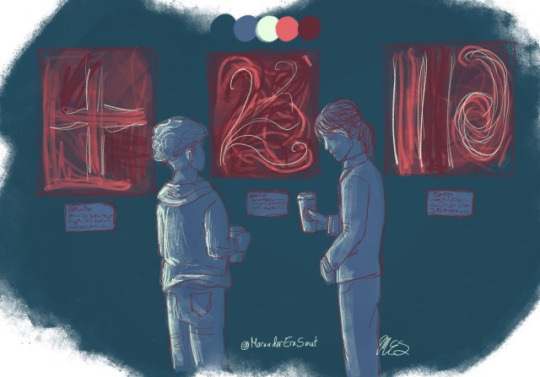
**THIS DRAWING IS NOT CANON! IT IS DONE BY MARAUDERERASMUT, NOT REMUS!**
#Wolfstar#wolfstar fanfiction#black and white#Remus lupin#Sirius black#remus x sirius#B&W#my writing#part 19#part nineteen#part XIX#IT'S FINALLY HERE!#THANK YOU EVERYONE FOR ALL OF YOUR ENCOURAGEMENT!!!#I LOVE YOU ALL SO MUCH!!!#YOU REALLY HELPED ME FINISH THIS CHAPTER!!!#AND I LOVE YOU!!!!!!#my art#limited palette#limited colour palette#Wolfstar AU#tw: alcoholism#Artist remus#Gallery owner sirius#modern Wolfstar AU#Harry potter fanfiction#modern au
190 notes
·
View notes
Text
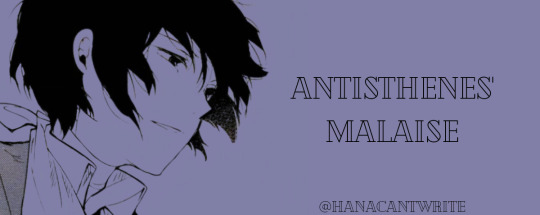
𝐬𝐲𝐧𝐨𝐩𝐬𝐢𝐬: “𝐢 𝐰𝐚𝐧𝐭 𝐭𝐨 𝐝𝐢𝐞 𝐢𝐧 𝐬𝐩𝐫𝐢𝐧𝐠. 𝐢’𝐥𝐥 𝐛𝐞 𝐜𝐫𝐞𝐦𝐚𝐭𝐞𝐝 𝐮𝐧𝐝𝐞𝐫 𝐜𝐡𝐞𝐫𝐫𝐲 𝐛𝐥𝐨𝐬𝐬𝐨𝐦𝐬. 𝐡𝐨𝐰 𝐧𝐢𝐜𝐞.” -𝐭𝐡𝐞 𝐟𝐮𝐧𝐞𝐫𝐚𝐥 (𝟏𝟗𝟖𝟒) 𝐝𝐢𝐫. 𝐣𝐮𝐳𝐨 𝐢𝐭𝐚𝐦𝐢
a retelling of a suicidal man's lost love that he realized a moment too late.

𝐩𝐚𝐢𝐫𝐢𝐧𝐠: osamu dazai x reader
𝐠𝐞𝐧𝐫𝐞: angst
𝐰𝐚𝐫𝐧𝐢𝐧𝐠𝐬: character death

i truly got into my bad aesthetic writing bag with this one

“𝐈 𝐖𝐀𝐍𝐓 𝐓𝐎 𝐃𝐈𝐄 𝐈𝐍 𝐒𝐏𝐑𝐈𝐍𝐆.” Your lips were painted an ice-cold blue, quivering with each word that managed to slip from your lips.
“𝐈’𝐋𝐋 𝐁𝐄 𝐂𝐑𝐄𝐌𝐀𝐓𝐄𝐃 𝐔𝐍𝐃𝐄𝐑 𝐂𝐇𝐄𝐑𝐑𝐘 𝐁𝐋𝐎𝐒𝐒𝐎𝐌𝐒.”
Even with the sad smile that dressed your lips, there was a warm twinkle in your eyes. It was something that gave you even the slightest semblance of joy, even with how grim those thoughts were, it was something that you could find solace in.
The downward spiral that your life had wasn’t something that you deserved, not in the slightest. There were hundreds and thousands of terrible people that littered the earth that would deserve the cruel hand that she was given.
But not you.
Though, he had to admit that it wasn’t too surprising and your case wasn’t something that was unique.
Sad endings always seemed to be something that everyone loved.
A happy ending was all too common, it was a cliche that he welcomed with nervous hesitance.
He took a deep gulp as he continued to stare at you.
Even as unsettling as those words were that you breathed out, he couldn’t bring himself to take his eyes off of you.
It was as if you would disappear the moment that he looked away.
“𝐖𝐨𝐮𝐥𝐝𝐧’𝐭 𝐭𝐡𝐚𝐭 𝐛𝐞 𝐚 𝐛𝐞𝐚𝐮𝐭𝐢𝐟𝐮𝐥 𝐬𝐢𝐠𝐡𝐭? 𝐈𝐭 𝐰𝐨𝐮𝐥𝐝 𝐛𝐞 𝐚 𝐬𝐞𝐧𝐝-𝐨𝐟𝐟 𝐭𝐡𝐚𝐭 𝐰𝐨𝐮𝐥𝐝 𝐛𝐞 𝐞𝐧𝐨𝐮𝐠𝐡 𝐭𝐨 𝐦𝐚𝐤𝐞 𝐞𝐯𝐞𝐫𝐲𝐨𝐧𝐞 𝐦𝐮𝐭𝐭𝐞𝐫 ‘𝐡𝐨𝐰 𝐧𝐢𝐜𝐞…’, 𝐢𝐭’𝐬 𝐚 𝐬𝐡𝐚𝐦𝐞 𝐭𝐡𝐚𝐭 𝐈'𝐥𝐥 𝐩𝐫𝐨𝐛𝐚𝐛𝐥𝐲 𝐝𝐢𝐞 𝐛𝐞𝐟𝐨𝐫𝐞 𝐭𝐡𝐞𝐧, 𝐛𝐮𝐭 𝐰𝐨𝐮𝐥𝐝𝐧'𝐭 𝐭𝐡𝐚𝐭 𝐛𝐞 𝐧𝐢𝐜𝐞?"
The fragility of your life was the same as that very cherry blossoms, it was a beauty that was unmatched by anything and it would be gone with a blink of an eye.
A deep silence filled the air but unlike all of those times before it wasn't suffocating, it was something that you could find even just a bit of peace in.
It was those small moments with him where it was simply quiet as you sat in his presence that meant the world to you, it was something that you knew you would miss when the time came.
Feeling his eyes on your figure, you turned your head to him, flashing him a carefree as those grim words hadn't just left your lips.
A set of soft giggles left your lips.
"𝐒𝐨𝐫𝐫𝐲 𝐚𝐛𝐨𝐮𝐭 𝐭𝐡𝐚𝐭, 𝐈'𝐦 𝐬𝐮𝐫𝐞 𝐡𝐞𝐚𝐫𝐢𝐧𝐠 𝐦𝐞 𝐭𝐚𝐥𝐤 𝐚𝐛𝐨𝐮𝐭 𝐭𝐡𝐚𝐭 𝐤𝐢𝐧𝐝 𝐨𝐟 𝐬𝐭𝐮𝐟𝐟 𝐛𝐫𝐢𝐧𝐠 𝐝𝐨𝐰𝐧 𝐭𝐡𝐞 𝐦𝐨𝐨𝐝 𝐪𝐮𝐢𝐭𝐞 𝐚 𝐛𝐢𝐭, 𝐝𝐨𝐞𝐬𝐧'𝐭 𝐢𝐭?"
You let out a soft sigh as you turned your head down, a melancholy smile dressing your lips. "𝐈 𝐝𝐨𝐧'𝐭 𝐡𝐚𝐯𝐞 𝐧𝐞𝐚𝐫𝐥𝐲 𝐞𝐧𝐨𝐮𝐠𝐡 𝐫𝐞𝐬𝐨𝐥𝐯𝐞 𝐚𝐧𝐝 𝐜𝐨𝐮𝐫𝐚𝐠𝐞 𝐭𝐨 𝐤𝐢𝐥𝐥 𝐦𝐲𝐬𝐞𝐥𝐟," you laughed out as you looked away from him, turning your attention back to the setting sun.
Even with his feelings, he couldn't bring himself to reach out to you.
You were only a few inches away but it seemed as if the distance between the two of you was impossible to close, you just seemed to be too far away.
"𝐃𝐚𝐳𝐚𝐢-"
He looked up at you, the chocked back voice breaking him out of his thoughts.
The sight of your figure up against the warm palette of orange and pink that painted the sky was more than enough to take his breath away.
But those next words that left your lips took his breath away in a way that he never wanted to feel.
At one point he wouldn't have minded hearing those words to fall from someone's lips but hearing them fall from your own left him with a feeling he didn't want to deal with.
"𝐎𝐬𝐚𝐦𝐮, 𝐈'𝐦 𝐬𝐨𝐫𝐫𝐲 𝐛𝐮𝐭 𝐢𝐭 𝐥𝐨𝐨𝐤𝐬 𝐥𝐢𝐤𝐞 𝐈 𝐰𝐨𝐧'𝐭 𝐛𝐞 𝐚𝐛𝐥𝐞 𝐭𝐨 𝐜𝐨𝐦𝐦𝐢𝐭 𝐚 𝐥𝐨𝐯𝐞𝐫'𝐬 𝐬𝐮𝐢𝐜𝐢𝐝𝐞 𝐰𝐢𝐭𝐡 𝐲𝐨𝐮."

"𝐓𝐇𝐄 𝐂𝐇𝐄𝐑𝐑𝐘 𝐁𝐋𝐎𝐒𝐒𝐎𝐌𝐒 𝐀𝐑𝐄 𝐏𝐀𝐑𝐓𝐈𝐂𝐔𝐋𝐀𝐑𝐋𝐘 𝐁𝐄𝐀𝐔𝐓𝐈𝐅𝐔𝐋 𝐓𝐇𝐈𝐒 𝐓𝐈𝐌𝐄 𝐎𝐅 𝐘𝐄𝐀𝐑, 𝐈𝐓'𝐒 𝐀 𝐒𝐇𝐀𝐌𝐄 𝐘𝐎𝐔 𝐀𝐑𝐄𝐍'𝐓 𝐇𝐄𝐑𝐄 𝐓𝐎 𝐒𝐄𝐄 𝐓𝐇𝐄𝐌."
And just like that it happened, a flower wilted almost as soon as it bloomed, falling down to the dirt as everyone mourned the tree's lost of blossoms.
It would be a lie to say that anyone really noticed a difference in his behaviour, it was as if nothing happened.
Every single day after seemed to be like a normal day, he never faltered in his usual comical attempts at suicide, never failing to let his faux smile leave his lips.
In fact, it seemed to be even easier to fake a smile now.
Maybe it was because there was no longer anyone there to make him give a real smile.
He let out a sigh as he looked up, it was a depressing sight to see.
The sight of soft pink petals wilting as they fell down to the ground was a sight that was something that encouraged the creeping melancholia.
A deep silence filled the air around him as he brought up the fingers, painted a soft red to his lips, blowing on them softly before rubbing them together as he felt the cool air hit his skin.
For someone that had witnessed mistakes after mistakes being made, it was something that he still couldn't find himself getting completely used to.
It was a part of him that he never liked thinking about.
He would've preferred keeping that side of him a secret until the day that he died, bringing all of his feelings along with him to the grave.
There wasn't a point in thinking about it.
If he wanted to, he could've just ignored the feelings he had and go on with his day like he had been doing for nearly his entire life.
But, he just couldn't.
How could he?
Even if people said that you were going to be missed and that your passing was something that everyone would have difficulty moving on from, people had had lives.
They couldn't afford to spend their lives grieving no matter how they felt about things and it was a rather hurtful way to think of things but you were going to be forgotten quickly.
Living their lives meant moving on and forgetting about ghosts that they couldn't afford to entertain for too long.
If he couldn't do anything for you while you were alive, the least he could do was at least try and remember things, it was something that he wanted to do but hated.
He couldn't ever picture himself forgetting you but at the same time, the memories of you brought him to a state of desolation he didn't think existed.
It was a bit too much to think that being happy was something that he was suited to.
Whenever he was in a situation in which he was happy, even if it was only for a little while, it was always a temporary state, it would always go away no matter how hard he tried to stop it.
𝐏𝐞𝐨𝐩𝐥𝐞 𝐚𝐥𝐰𝐚𝐲𝐬 𝐝𝐢𝐬𝐚𝐩𝐩𝐞𝐚𝐫𝐞𝐝 𝐥𝐢𝐤𝐞 𝐭𝐡𝐞 𝐛𝐞𝐚𝐮𝐭𝐢𝐟𝐮𝐥 𝐛𝐮𝐭 𝐭𝐞𝐦𝐩𝐨𝐫𝐚𝐫𝐲 𝐧𝐢𝐠𝐡𝐭.
He let out a dry laugh as he tossed his head back, looking up at the pale blue sky with a small smile dressing his lips.
It seemed to lose the colour that it once had before, the moment that the snow first started to fall, it seemed to make everything lose the life that made everything seem so enjoyable before.
Though, he guessed he couldn't really be mad that was the sight that he was left with.
Considering everything, he deserved much more than that if he was truly being honest with himself.
There's a quote by the Greek philosopher, Antisthenes, he once said:
"𝐈 𝐀𝐌 𝐒𝐀𝐃𝐋𝐘 𝐀𝐅𝐑𝐀𝐈𝐃 𝐓𝐇𝐀𝐓 𝐈 𝐌𝐔𝐒𝐓 𝐇𝐀𝐕𝐄 𝐃𝐎𝐍𝐄 𝐒𝐎𝐌𝐄 𝐖𝐈𝐂𝐊𝐄𝐃 𝐓𝐇𝐈𝐍𝐆."
Now, wasn't that a line that he could understand more than anyone else, he truly did commit such a wicked deed, one that he could never fix.
He realized his love a moment too late.
#bungou stray dogs#bungo stray dogs#bsd#dazai osamu#osamu dazai#dazai x reader#osamu dazai x reader#bungou stray dogs dazai x reader#hana writes#myposts
10 notes
·
View notes
Photo

Dominic Miller.
Absinthe, 2019.
ECM 2614.
( Manu Katché )
~
[ Album Review |
1) ECM Reviews + 2) All About Jazz +
3) London Jazz News ]
1) The title of Absinthe, Dominic Miller’s follow-up to his 2017 ECM debut, Silent Light, harks to the early French Impressionists, whose all-in dedication to art is a philosophical touchpoint for the guitarist. To carry on that spirit, he could hardly have asked for a more eclectic yet integrated band. Bandoneon player Santiago Arias brings a sense of cross-continental shift that makes the world just a little smaller; keyboardist Mike Lindup adds a sometimes-surreal vibe that’s equal parts cry from the past and message from the future; bassist Nicolas Fiszman is the soil to Miller’s sunlight; and drummer Manu Katché, a remarkable impressionist in his own right, is time incarnate.
With such a massive scale to be reckoned with in theory, one might expect the results to be overpowering, when in practice the melodic, harmonic, and rhythmic content is so evenly distributed between pans that by the end of each tune we’re left on an even keel from where we began. This is nowhere so true as on the opening title track, which spins a steady downtempo groove from the filaments of Miller’s solo introduction. The way his bandmates shuttle through the greater loom of the album’s concept is as intuitive as the compositions yearning for consummation. A certain feeling of inward travel continues in all that follows.
The quiet locomotion of “Mixed Blessing” and is as progressive as the tender “Christiana” is regressive, the geometrically inflected “Étude” as inviting as the open-ended charm of “Ombu,” the melancholy “Ténèbres” as dark as the transparent “Saint Vincent” is bright. The latter bears dedication to the late Cameroonian guitarist Vincent Nguini, a longtime collaborator with Paul Simon and something of a mentor for Miller. Even without such biographical details, these stories write themselves, unhidden, in real time. Binding their pages are shorter pieces, including the piano-rich “Verveine” and the haunting “La Petite Reine.” Into these we are afforded only fleeting glimpses, personal tesseracts whose potential for transfiguration can only be expressed in song.
All of which makes “Bicyle” quintessential in the present milieu. Its pedaling motion is more than a metaphor; it’s an actualization of life’s unstoppable flow. For there, woven between each spoke like a playing card, memories fade into new experiences, squinting into the glare of a setting sun as the world curls into slumber.
2) Guitarist Dominic Miller's 2017 ECM debut Silent Light was a low key affair that focused on his solo classical guitar (plus a bit of light percussion). The sequel features a full quintet with a rhythm section. A bigger sound, but with a similar impressionistic flavor. Miller's liner notes make that visual art reference explicit: as a resident of the south of France he has become fascinated with the French Impressionist painters, admiring their artistic daring.
The album opens with the title tune: Miller's acoustic guitar and drummer Manu Katche's swirling cymbals set the scene for the entry of Santiago Arias' bandoneon, the primary melodic instrument in the music. It is a significant new timbral color in the ensemble, as well as a nod to the avowed Argentinian influence in Miller's music. "Mixed Blessing" includes a synthesizer solo from keyboardist Mike Lindup, a contrasting sound that is favored throughout the set; although on "Étude" his piano playing is a foundational element.
The spare, low rumbling drums and guitar of "La Petite Reine" recall the sound of Silent Light. "Étude" and "Ombu" step up the tempo a bit, and the latter gives the drums a highlighted role as active rhythmic accompaniment for the whole band: no doubt very satisfying for Katché fans who have been waiting to hear him cut loose. Closer "Saint Vincent" is an upbeat tune that features the whole band, with solos from Miller and Lindup (on piano).
Miller has an expanded musical concept to go with the larger band. The tunes are still compact statements, but make use of the instrumental forces for greater timbral contrast. And he is a generous band leader as well: while his guitar is at the center of the arrangements, all of the players are given a chance to shine. It will be interesting to see where he goes next.
3) Absinthe is Argentinian-born guitarist Dominic Miller’s second release for ECM and his fourteenth solo album. The list of recordings with other people, however, is immense. Even if his name is unfamiliar you have probably already heard him. He has played with Sting since The Soul Cages in 1991 and masses of other musicians along the way, from The Chieftains to Youssou N’Dour, via Tina Turner, Lesley Garrett, Sarah Jane Morris and Manu Dibango. Some of the musicians with whom he has recorded make up the new quintet for this album.
Absinthe is an airy, atmospheric set of compositions inspired by Miller’s love of the works of the Impressionist artists, many of whom painted in the South of France where he now lives. The title came to him first, apparently – many of the impressionists drank absinthe, that potent anise-based spirit favoured by bohemians known as “la fée verte”. In a recent interview with German news site DW.com, Miller expands on the title:
“For me it’s about being out of it. And over the last few years I’ve really been into French paintings and thinking about this history of the early 19th century and how Lautrec and Van Gogh and a lot of these guys were tripping on absinthe but still coming up with amazing work. And because they were such highly skilled artists they could come up with these really outrageous trippy concepts with colour.”
Miller put together a quintet sympathetic to his ideas and wrote the music with the “sonic palettes” of his chosen musicians in mind. First up is young Argentinian Santiago Arias who studied under Dino Saluzzi at the Conservatoire in Buenos Aires. He plays the bandoneon, that concertina-like instrument associated with Argentinian tango. His sound is pure and extremely melodic. The combination of Miller’s lyrical guitar with Arias’ lovely lines is delightful – they are the perfect foil for each other. The other three musicians have all played with Miller for years.
On keyboards is Englishman Mike Lindup, best known for his work with Level 42, but a regular performer with Miller, who played with Level 42 himself back in the 80s. Lindup’s is a third melodic voice with the guitar and bandoneon – he also adds delicate ethereal tones, almost theremin-like in places.
On bass is Belgian Nicolas Fiszman. He studied guitar with Philip Catherine, then changed to bass. He’s played with Miller since 2005, but has accompanied Johnny Halliday, Angelique Kidjo, and Charles Aznavour in his time. Miller describes his playing and intonation as having “the nobility of a great whale”, which is a lovely description and also, I think, fair enough. His subtle and discreet bass underpins the whole endeavour.
Miller describes French percussionist Manu Katché as “an artist on the drums, especially with his cymbal work where he is like a great painter”. His presence is everywhere on this recording, and his contribution adds colour, as well as texture to the pieces. Katché is well-known as a session musician – having played with almost everybody. He’s also an ECM veteran. Miller has recorded with Katché as part of his band, and he’s another long-serving member of Sting’s band, so they know each other musically very well.
It’s an unconventional combo, but it works well – the range of timbres and harmonies is extremely agreeable. There’s an Argentinian tinge to much of the music, though think Gotan Project, rather than Astor Piazzolla, as there is a groove through many of the tunes, not just from Katché’s inventive percussion but the rhythmic qualities of the ensemble playing. On an initial hearing the CD appeared light and easy, bar some disjunct improv in the track Ombu, but this is misleading. I think that the limpid clarity of the production (by Manfred Eicher himself), the pleasant atmosphere, the sweetness of tone and the downright prettiness of the guitar and bandoneon sound just gives that impression. As is often the case with music which can be perceived as light or suave, like bossa nova, for example, on a closer listen, the complexity of the composition and the beauty of the ensemble playing comes through.
From the first track Absinthe, where the bandoneon, after a precise harmonious intro, starts sliding about into little patches of dissonance, and the spectral notes from the synthesiser twist around against a backdrop of precise strings and strangely colourful cymbal sounds, the listener is entranced. By the final track, Saint Vincent (presumably a reference to Van Gogh rather than the countless catholic saints, or indeed the American singer/songwriter of the same name) the sonic palette has been fully explored. Miller’s guitar playing is wonderful throughout, lyrical, deft and harmonious. Saint Vincent builds in layers of colour and light to a Pat Metheny-esque crescendo and then disappears as if blown away by the mistral.
This record will appeal to Miller fans, to Sting fans, to existing fans of any of the other members of the band, and to new listeners who are already aficionados of ECM’s fine output of chamber music. As usual, I now want to hear this live, and indeed a grand promotional tour for Absinthe of Central and South America, and Northern Europe was planned. Sadly it has had to be cancelled for health reasons. Wishing Dominic Miller a speedy recovery.
#jazz#jazz guitar#dominic miller#manu katché#ecm#2019#2010s#2010s jazz#ecm reviews#all about jazz#london jazz news#review
5 notes
·
View notes
Text
Tokyo Street Styling: The Aesthetics of Japanese Street Fashion
a.k.a. why do some outfits have a ‘very Japanese’ aesthetic and others don’t?
If you’ve ever scrolled through the TokyoFashion instagram, you’d see outfits of all types and styles, ranging from the ‘classic’ harajuku staples like decora and lolita to the more street-style based coords of which an overall style is yet to be properly named.
Over the years that I’ve been an observer and a follower of these styles, I’ve noticed a gradual but significant decrease in actual Japanese people wearing the ‘classic’ sub-styles and more and more venturing into the realm of the nameless umbrella which is ‘tokyo street fashion’.
And yet harajuku fashion isn’t really dying, it’s transforming into something completely new (mentioned in this post). And what interests me the most is how these new styles are so different from the so-called OG sub-styles and yet are distinctly Japanese.
So this post will attempt to talk about that in as short of a post as I can manage
This other post already mentions the basics of Japanese street style so I won’t go over that in much detail again.
❀❀❀
First, a quick background of Japanese colours.
Japanese colours in the Edo period were originally split into three categories:
The Colours of Animals
The Botanical Colours
The Colours of Nature
And these colours in varying proportions would evoke certain seasons or feelings. Some colours are tied to spring, others to autumn. And borrowing from confucianism and taosim, there are colours that are tied to specific elements.
Nowadays, these are not completely strictly adhered to, since the West introduced their own colour theory after the Edo period, but there is a lot of the original colour theory of Japan that is still relevant in their aesthetics today.
Sources: 1, 2
❀❀❀
Next, a quick introduction to some of the main concepts of Japanese aesthetics:
♔ Wabi-sabi
The idea of embracing transience and change, but also imperfection and incomplete objects, as it is natural. Think of the sakura that only blooms for a short while, the idea of things growing, flowering and then decaying, and finding beauty and peace in that process is part of wabi-sabi.
♔ Yūgen
Referring to “something dim, deep and mysterious, something that cannot be understood”. The Japanese also don’t believe this feeling can be expressed in words, but I think the closest explanation is a sense of profound melancholy and gentle grace.
(Think of mode, karasuzoku, outfits by Rei Kawakubo, can possibly be applied to mori kei)
♔ Iki
A combination of intellectuality and sensibility. It is simplicity and sophistication, or maybe even sophistication in simplicity. It refers to the unselfconscious, measured and straightforward. It usually is used to relate to a person, but we shall see how it applies to fashion in a bit.
(Mori kei is the first thing that comes to mind, but also pop kei and classic lolita)
♔ Shibui
The aesthetic of simplicity and unobtrusiveness. Shibui refers to things that are overall simple, but when observed more closely are detailed and textured and refined. It has a balance of complexity and simplicity.
And of course the most important one to this context:
♔ Kawaii
The concept of cuteness and being loveable, found in most Japanese street fashion.
I find that these, in their various combinations and proportions, make up a lot of what is Tokyo Street Fashion.
Sources: 1, Aesthetics of Colours in Japanese Paintings and Woodblock Prints in the Edo Period (Siying Wang)
❀❀❀
So. How does this all apply to fashion?
I’m going to use some examples here to describe what I mean.
♔ Strawberry Candy Outfit
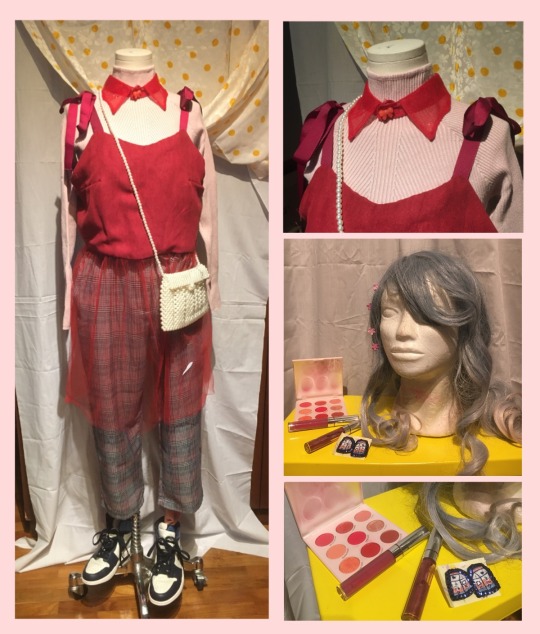
I call this the strawberry candy outfit because it is indeed the colours of a strawberry candy. So outfit breakdown: why is this an example of Japanese street fashion?
Firstly, the use of layering textures and sheers is a common part of Tokyo street style, as well as the use of colour blocking. The overall colour palette is based around pink, so the makeup and accessories would match that, and the blueish-grey of the hair and the blue accents on the shoes and the earrings provide the littlest bit of contrast.
So colourwise, I’ve decided to use pink as my main colour, and the red, white and grey are all secondary to that, though by playing with proportion, I can ‘even out’ the amount of pink and make it less overwhelming. Pink is made of red and white, so I broke apart the red and white, and then added grey to make the look more neutral, but also feminine.
The main aesthetic concepts I am following here are Shibui and Kawaii. There’s an overall cute energy that comes from the bows, red tulle and pearls. And yet it’s a very balanced look, not overly cute. The idea is to play with the textures and patterns to give it more dimension.
♔ The Utilitarian Office Lady
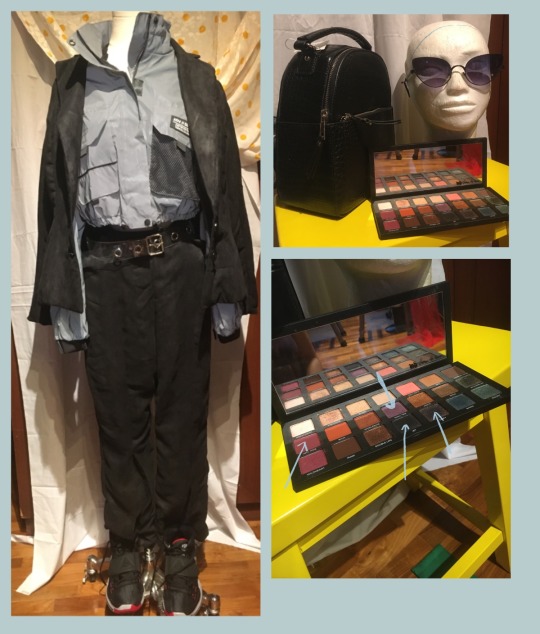
This coord is based around a monochrome palette, the suit is made of a pair of flared trousers and a boxy jacket, which on its own can make a cool base for a karasuzoku outfit or a mode outfit.
But here I layered the suit jacket over another jacket of reflective grey fabric, with a lot of utilitarian elements to it, and also added a plastic belt with grommets punched into it. The hair could just be a really long sleek ponytail, and the faux reptile skin backpack and dark makeup would go nicely to give it more of a street-style edge. The shoes are black Nike Kyrie 6 EPs but really any chunky black sneaker will do.
This one is more following the aesthetics of Shibui and Iki. It’s unobtrusive in the way that it is sleek and monochromatic, but it’s also very detailed in all the contracting sheen and texture of the outfit. The matte suede of the suit with the reflective polyester of the jacket, as well as the reptile skin and the mesh. There’s a subtle contrast there.
This outfit, I would say is very straightforward and simple, but there are so many interesting layers about it that give it more dimension and personality.
♔ The Edgy Gyaru
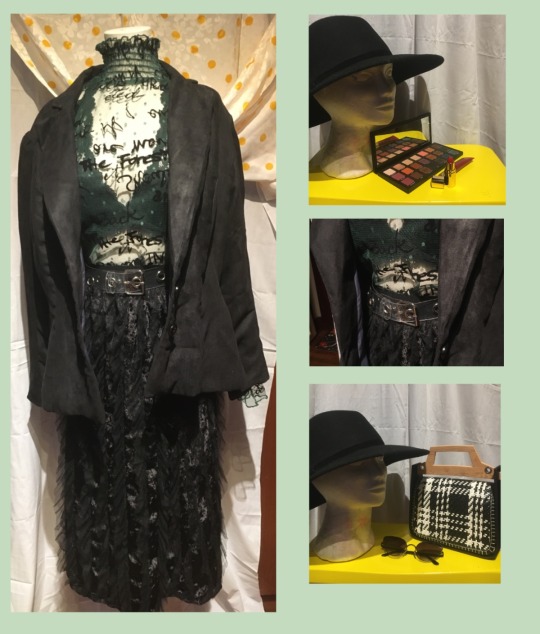
This outfit is inspired by the modern gyaru. The sheer top can easily be paired with a shorter skirt and knee high boots to be Even More Gyaru, but I’m going with this skirt because I find it more interesting. This outfit leans more towards the Rokku Gyaru sub-style, and would go with light ash grey coloured hair and the typical gyaru makeup.
This look is a mostly Iki sort of aesthetic. There’s a sexier type of sophistication in this look, and it’s mostly in dark muted colours, but the details make it far more interesting than it first seems.
This is the most ‘mild’ of the looks I’ve shown here, and it’s largely because this one has the most western influence. This look will be a lot more tokyo street with the makeup and the hair styling factored in, but just as it is, it’s actually more of a blank slate.
❀❀❀
If you’ve read this far, thank you! It’s been a long post, but to conclude:
The world is becoming very interconnected and very globalised. Which is great for spreading word of a style or a trend, not so great for maintaining the so called ‘purity’ of that style or trend. And as styles and trends progress over time, they can die out, they can change into something new, and I am of the opinion that that change should be welcomed.
However, we can’t forget where the original trend came from or where the style evolved to add another layer on top of an older trend or to completely reject it and become something even newer and unseen.
Other countries and cultures have been adopting Japanese aesthetics into their street culture ever since the ‘big 3’ of Japanese designers were introduced to the world in the 80s. There are elements of Japanese street style in Parisian and New York streetwear, just as there are western influences in Japanese street style.
In fact South Korean, Chinese and Japanese street style is becoming more and more homogenous, and sometimes it takes me a while to even figure out where the specific outfit i’m about to share is from.
I hope this post was helpful in explaining how to spot the core aesthetics that make Japanese fashion so Japanese, and I hope you, my dear readers, can use this info to craft your own outfits.
The traditional Japanese colours and aesthetics aren’t a hard and fast rule, but if you want to dress more to the style, it’s a pretty good guideline to really ensure you’ve got the coord right.
#tokyo street style#tokyo street fashion#japanese street style#japanese aesthetics#street fashion#styling tips#verdant talks#verdant styles
8 notes
·
View notes
Text
Through My Eyes
Tousled hair in shades of cinnamon, caramel and gingerbread.
His cheeks were slightly flushed, as well as the tip of his nose. His honey-coloured eyes were quickly moving left and right as he was reading a book. He looked positively engaged in whatever he was reading, as if he had forgotten the world around him.
What a soft-looking man. He looked so cosy. Warm and gentle; even in the pale light of London's tube. Was it his slightly oversized, knitted jumper he was wearing that was giving him that cosy vibe?
From the moment you first put your eyes on him, you started to make up a whole backstory of that stranger. Was he carrying around notebooks full of drawings in his old-looking leather bag? He could be an artist. Maybe he was making illustrations for books?
But what if he wasn't the one drawing for books, but the one writing them? You imagined him sitting by a desk in the middle of the night, typing away. Maybe he wrote poems? No, if he was a writer, he was probably writing novels full of mystery with hints of romance and melancholy.
Yeah. There was that hint of melancholy coming from him, but you couldn't really point out where it was coming from.
Maybe he had the same worries as you. That certain loneliness that overcame you from time to time. That loneliness that was still there, even when you were with other people. That kind of loneliness, that made your heart cry for someone to fully pull you out from the darkness around you, into a place full of light and warmth.
Did he live by himself? Again, your imagination ran wild. You saw him lying on an old and chunky two-seater, staring at the ceiling, clearly lost in thoughts. His apartment was furnished in the same colour palette as his clothes - tan and beige, shades of warmth. And some easy to maintain plants. Old fashioned, just like he looked like an old soul to you.
How would it be to fall in love with him?
As if he was reading your mind, he looked up at that very thought.
You took him back from whatever place his book had taken him. He needed a second or two before he realized where he was, who he was. And as the corner of his lips turned slightly upwards, you believed that maybe he really was capable of reading minds. And maybe, in those two seconds, he was making up his very own story about you.
He skidded sideways and gestured to the space he just cleared for you. Without any hesitation, you nodded at him in appreciation and sat down beside him. You knew your voice would come out weird and raspy, if you'd say your thanks out loud. And he didn't seem to mind, as his smile grew a little wider. You looked at each other for another second. Then, he returned his attention back to his book.
You closed your eyes and took a deep breath. He smelled like spiced tea.
Would you go for a cup of tea on your first date? And would he wake you up with a cup of tea on your one-hundredth date?
It felt so natural, so easy to imagine your time together with him. All the same old places you knew and visited ever so often, suddenly felt so much more exciting as you imagined being there with him together.
Things like going grocery shopping would suddenly be the thing to look forward to after a long day at work - if it would be with him.
Visiting the park and reading books in silent together - what a nice idea that would be now that it was spring.
He was a stranger. You had never seen him before, you did not know his name or his age. And yet, it was as if he just belonged there with you. And something would be missing without you.
It was such a strange way of thinking, but you were sure you lost a piece of your heart to that stranger. Most likely, you would never see him again. But maybe - even it the possibility was almost non-existent - there would be a next time.
And if there wasn't, you wouldn't be sad about it. At least, nothing could ever prove that he wasn't the way you imagined him to be. He would be the one, that enjoyed maple syrup on vanilla ice cream just as much as you did. His hugs would be just as warm as your bed on lazy Sunday mornings. And his smile would always be there to make your heart beat just that little bit faster.
And then, the tube stopped.
And the scent of warm spices still lingered in your nose as you walked home, longing for something that will never be.
#warm and comfy#fanfiction#drabble#harry potter#remus lupin#reader#original character#love#love at first sight#fantasy
2 notes
·
View notes
Text
More album releases by Find A Song artists!
Vancouver Sleep Clinic - Onwards to Zion
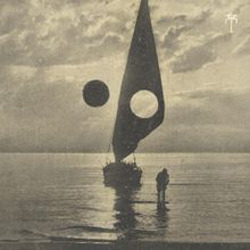
Vancouver Sleep Clinic released his debut project to critical acclaim in 2014 when he was just seventeen years-old. Now--following years of major label purgatory and a concerted effort on Bettinson’s part to reclaim his music for himself--Vancouver Sleep Clinic releasef its transcendent sophomore album, Onwards to Zion, written during a period of isolation in Bali with his friends in the fall of 2018. In a purposeful departure from his forays into electronically driven song construction, Bettinson wrote much of the album on a $100 nylon guitar bought at one of Bali’s only music stores. “I’d started getting used to making three-and-half-minute songs with a beat and a hook—but the thing is that I don’t really come from making beats,” he says. “I used to busk: that’s where I came from. The whole direction of this album changed for me once I realized I wanted to put the focus back on guitar again.”
Despite the relative simplicity of its origins, Onwards to Zion bears a distinctly collagic sonic palette, encompassing everything from ethereal atmospherics to psychedelic synth tones to hazy samples of ’60s jazz-pop records. Not only a return to the self-reliance of Vancouver Sleep Clinic’s early material, Onwards to Zion also marks a deliberate tonal shift from his multi-part project Therapy 1 and Therapy 2 in 2018 “The Therapy songs mostly came from a place of frustration—just me complaining about the situation I was in back then,” says Bettinson. “When I sat down to think about the new album, I realized I don’t want my discography to reflect bitterness: I want to put something positive into the world. So even though it’s got some darkness, and it’s a bit of an emotional rollercoaster at times, the album is very much coming from a place of love. I’d love for it to leave people feeling re-energized, and ready to just keep pressing on in their own lives.” (press release)
Dylan Perkons- The Healing Day
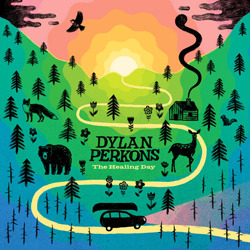
A collection of richly orchestral songs that tell the story of an experienced songwriter finally stepping out to record under his own name. Perkons has spent his career working on various projects, honing his craft both on the road and in the studio, so while The Healing Day is his first solo outing, it represents a much longer journey.
Perkons knew early on he wanted to work with producer, Jonas Bonnetta of Ontario folk-outfit Evening Hymns, and had the privilege of recording at his secluded Port William Sound in Mountain Grove, ON. The woods were the perfect backdrop for an album that required, above all else, space. While the album was largely performed by Perkons and Bonnetta, The Healing Day also features a handful of Canadian indie mainstays like Michael Feuerstack (Snailhouse,The Luyas), Pietro Amato (The Luyas), Edwin Huizinga (The Wooden Sky), and Lisa Conway (L CON).
The album draws influence from Canadian folk songwriters that have come before him and while Perkons’ familiarity is comforting, he uses it as the foundation for his atmospheric indie-pop. The opening instrumental track feels like dawn, bringing listeners immediately into the woods before Perkons’ deep baritone breaks in, beginning the album’s tellings of imperfect, but meaningful, love. The songs move through relatable despair, knowing sometimes love must be set free in order to grow. There are also moments of reprieve where it is easy to imagine an audience singing along to the chorus in “Love Like Mine”. The album finishes with “Halfway to Winnipeg” where Perkons cultivates hope in the midst of self-deprecating sincerity.
The Healing Day is best described as layered. These are earnest, well-crafted songs, brimming with strings, french horn, electric piano and a plethora of synthesizers, creating a distinctive universe for the listener, one they will want to visit over and over again. (press release)
Foreign Television - Foreign Television

Foreign Television is the solo project of Francis Allen, a musician from Wales, UK, currently based in Moscow, Russia. This is the new, self-titled album, which will be released on October 21st, 2019. All songs are written and recorded between 2016 and 2019 by Francis Allen.
Bands that have Influenced Foreign Television's sound include: Teenage Fanclub, Red House Painters, Radiohead, Mew, American Football, and The Smashing Pumpkins.
The first Foreign Television album, 'Youthless', came out in 2013. The project was started in 2011, having released 4 instrumental albums as 'Snowmobile' between 2007 and 2011. The most noticeable difference between the two projects was the introduction of vocals and a new style of songwriting. A song off 'Youthless' (Olympic Christie) is going to be featured on 'Waking', a game coming out on Xbox in the next couple of months. (press release)
Portland - Your Colours Will Stain
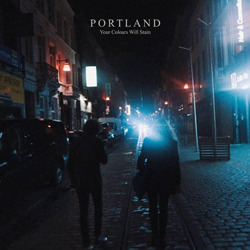
Portland is the creative brainchild of musician and songwriter Jente Pironet. Sometime during the misty autumn of 2015, Jente collected a huge amount of song material, without a specific end purpose. Over the years, the songs were refreshed, adapted, rewritten and eventually gathered together and poured into a new creative receptacle by the name of Portland, a nod to the home of the late Elliot Smith.
After a short period of experimentation, Portland gradually began to patent a dreamy and melancholic pop sound. The lyrics are loaded with melancholy and nostalgia and the song structures are very recognisable and apt.
While Jente was completing his studies as a singer and songwriter at the PXL Music college in Hasselt, first-year student Sarah Pepels wandered down those same corridors one fateful day. The two shared the same student house but more importantly they shared the same interests and ideas about music. The ‘musical soulmates’ found each other and Portland soon became a duo. The song material was revisited and it quickly became clear that Jente and Sarah’s voices were a wonderful match. Along with Gill Princen on electronics and Arno De Bock on drums, Portland continued the search for their own sound.
The group had big ambitions from the start and set the bar high. They took part in Humo’s Rock Rally in 2016 and two years later they signed up for De Nieuwe Lichting. This Belgian radio competition run by Studio Brussels allowed the band to take a big step forward. They were crowned one of the three winners and the debut single ‘Pouring Rain’ became an unexpected success on streaming platforms. The next records ‘Lucky Clover’ and ‘Expectations’ showed that Portland meant business. The songs are all rich in dynamics and melody, while Jente and Sarah’s harmonious voices really strike a chord. A club tour sold out quickly and, in the summer of 2019, Portland was able to cross both Rock Werchter and Pukkelpop off their bucket list.
Over the rest of the summer, the band worked on their debut album with producer David Poltrock (MIA 2019 for Best Musician). While yet another heatwave raged outside, sweat was literally dripping from the walls in Poltrock Palladium (Poltrock’s own studio in Brussels) and in the DAFT studio in Malmedy too. More than 100 songs and separate ideas were carefully weighed up. There was plenty of experimentation with rhythms, types of sound and structure as some songs were split up and then put together again.
'Your Colours Will Stain’, Portland's debut album, brings together 11 tunes that demonstrate perfectly who Portland is. From stylishly arranged and dreamy indie rock (‘Lady Moon’, ‘Ally Ally’) to funky, danceable electropop (‘You Misread Me’) to pure piano ballads (‘Pearls’). From grand and epic (‘Expectations’) to shamelessly poppy (the irresistible ‘Killer’s Mind’) to fragile and intimate (‘Moonlit’). And sometimes all at once (the overwhelming ‘Deadlines’). But in every song there's these two voices, two incredible voices that pull on all the heartstrings. With ‘Your Colours Will Stain’ Portland has created a mature and confident album, one that ticks all the boxes and shows a band that's ready for the bigger stages. (press release)
Manic Carbon - The Sun Is Gone & The Moon’s Off Too
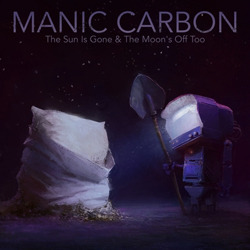
Manic Carbon is a band risen from the ashes of yesterday's internet. Its members, spread between four cities and two continents, met on a long-dead music forum in the mid-2000's. Today, they make music by sending tracks back and forth, building and improvising on each other's ideas. "The Sun Is Gone & The Moon's Off Too," the band's debut album, is a nostalgic journey that descends from the slick, brooding opener "Enter the Dreamhouse," to the sunshine pop of lead single "The Reset Era," and the sublime cloud rap of "Gimme the Dream Touch" and "Talker." The record grows darker as it progresses, ending with the fearsome and haunting "Palindrome," where vocalist Moral Reef raps from a place of nightmare. The album is sure to please fans of Superorganism, Animal Collective, Toro Y Moi, and Brockhampton. (press release)
#music#music blog#indie music#alternative music#albums#Vancouver Sleep Clinic#Onwards to Zion#Dylan Perkons#The Healing Day#Foreign Television#Portland#Your Colours Will Stain#Manic Carbon#The Sun Is Gone & The Moon's Off Too#indie#alternative#find a song
1 note
·
View note
Text
Teenage Mutant Hero Turtles (Imageworks, Commodore 64, 1990)
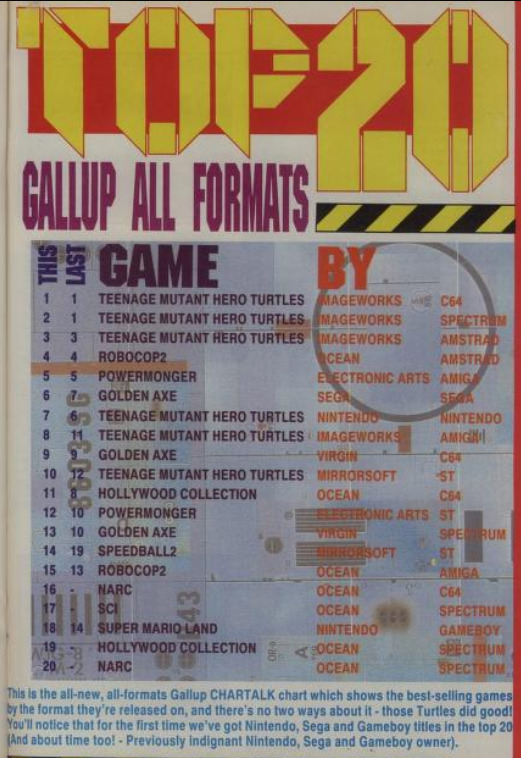
Gallup all formats individual formats chart, Computer & Video Games Issue 112, March 1991
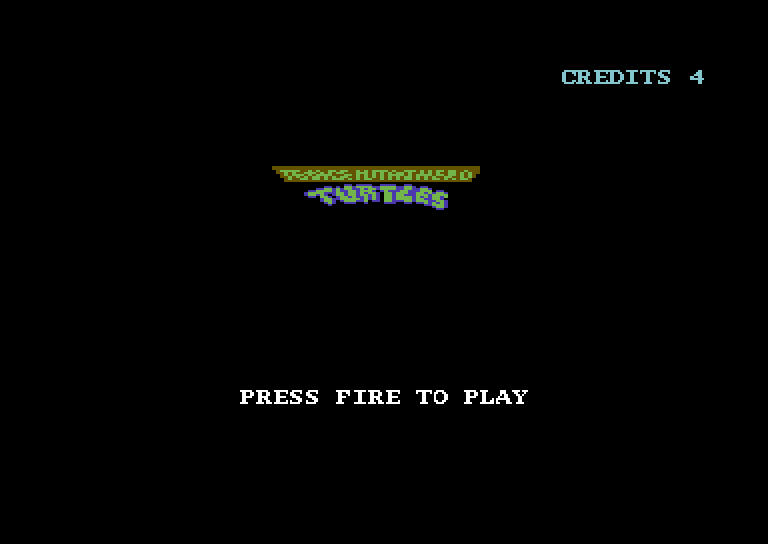
The first time I read a piece of art being described as a Xerox of a Xerox of a Xerox I had to guess the meaning from context. In the UK things sometimes have different names, and we just call them photocopiers. The idea of something that loses sharpness and detail as it gets replicated, and the replication gets replicated, is a useful one. The proper modern description might be a screenshot of a screenshot of a repost of a meme.
The chart-topping Commodore 64 version of Teenage Mutant Hero Turtles is a contender for the apotheosis of the series of increasingly jpeg-artifacted screenshots that was the ninja trend in the UK. Look at the number of steps it took to get here. Manga including Kozure Okami, by Kazuo Koike and Goseki Kojima (Japanese) inspired (American) Frank Miller’s Ronin and stint on the comic Daredevil. These were among the chief sources for a parody comic by Kevin Eastman and Peter Laird (American) called Teenage Mutant Ninja Turtles. Murakami-Wolf-Swenson (also American) changed the tone and emphasis of the comic for a massively popular, family-friendly, cartoon series. This then got taken up by Konami (Japanese) and turned into a couple of video games for the Famicom/NES that were the first time the Turtles made it to Japan. And, finally, Image Works (British, not to be confused with Sony Imageworks) converted the NES game to formats more popular in the UK, releasing them under the TV series’ British title Teenage Mutant Hero Turtles.
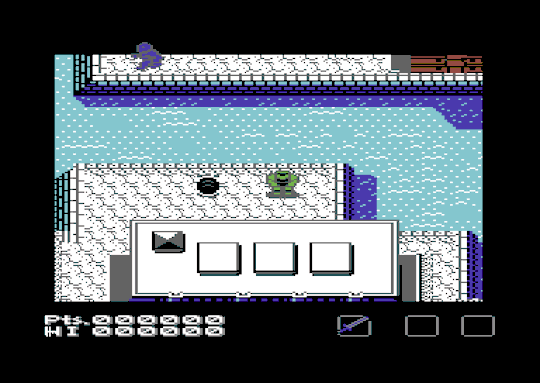
Yes, we are far enough away from ninjas that the word no longer even appears in the title, scrubbed out by the same kind of fear that saw the special edition of Last Ninja 2 helpfully banned from shops. The Teenage Mutant Hero Turtles that I watched on the BBC on Saturday mornings also had appearances of nunchaku removed, that weapon being considered more easily rigged up and imitated by impressionable children than big swords and not family-friendly enough. I don’t think I ever tried for my own home nunchaku but obviously I was totally unaware of them; QED.
I was a big enough fan of the show to have assorted TMHT merchandise, including some kind of illustrated story book and TMHT cutlery, though I might only remember the latter because it fork survived a decade longer in our house to be used for putting our cats’ food into their bowls. I’m not aware of ever giving much thought to the chain of origins of the show, being barely aware of its American-ness at most, since shows here were divided enough between British and American for neither to be particularly remarkable. I don’t remember that much about the show but could recall the names, signature colours and vague personalities of the four turtles and some generic messages about the power of friendship.
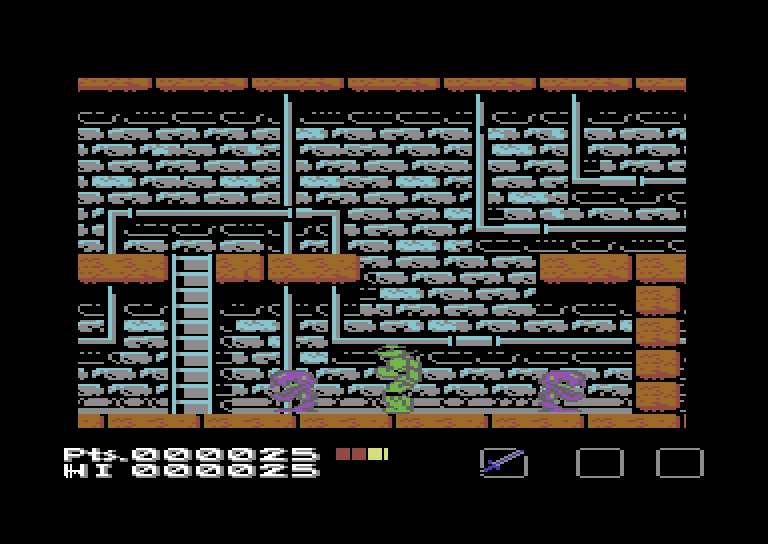
Not even that much survives into the computer game, an action platform game in which having characters with masks of blue, red, orange and purple proves too much of a challenge for the the Commodore 64’s palette. The turtles don’t appear simultaneously but when one is defeated another takes their place, Platoon style, which barely keeps the feeling of a gang there. The nunchaku make it back in, so it’s lucky for the safety of those near me that I never played it at the time. Nothing much beyond the selection of similarly-acting weapons marks out the thematic origins of the story at all, in fact. It’s a not particularly stunning version of a not particularly stunning game which was popular for its surface closeness to something else popular, which might once have resembled some other things. It’s weirdly melancholy as a result. The Commodore 64 version is clearly the same game as the NES one in a way which, say, the Spectrum Ghosts ‘n’ Goblins wasn’t, but the low-resolution sprites and faded palette make the jpeg-artifact resemblance more than metaphorical.
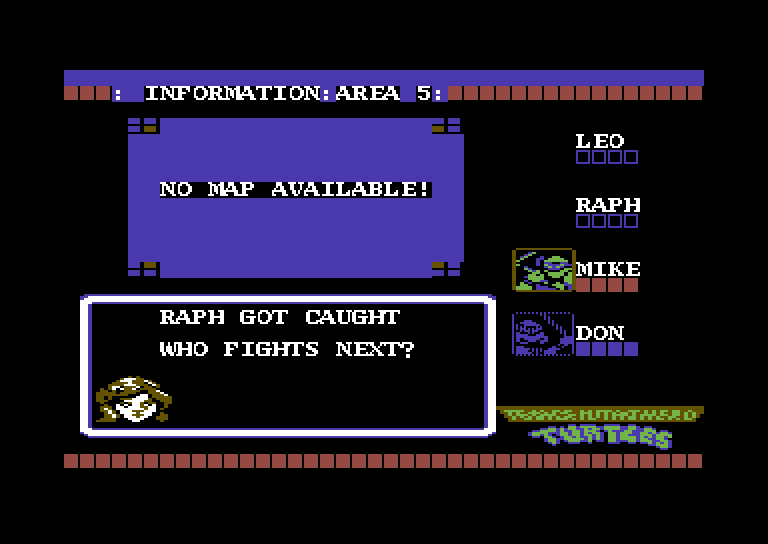
#every number one#retrogaming#Commodore 64#C64#Teenage Mutant Hero Turtles#Teenage Mutant Ninja Turtles
1 note
·
View note
Text
Fereldan Rain || closed
The Inquisitor rested his arms across the ledge of the balcony, feeling the light patters of rain sprinkle against his face. It wasn’t enough to cause discomfort, in fact Kaaras was very used to the weather of Ferelden considering it was where he grew up.
There was something comforting about the greyness against the long fields of green. Even if he enjoyed the golden warmth of the sun, and even if he welcomed the cold white of snow. All weather seemed to be an enjoyment to the qunari, something he could feel and take in. And there was that crisp freshness on the edge of the storm that touched his skin as lightning flickered and thunder rolled across the landscape.
Perhaps it was just that he enjoyed being out of Skyhold. There was something so very comforting as he stood outside the cabin, old wooden boards beneath his boots and the scent of fire burning before a hearth.
@scarsthatshapeus || Ariadne
Ariadne was not used to the cold. Despite how long they had spent in Skyhold, she still felt shivers run up her spine with the damp cold. But this was meant to be a break, so she just bundled up as much as she could and enjoyed the time away from the fighting. She leaned against the doorway, protected by the roof, and watched her friend relax. He had obviously missed his home.
She’d never been to Ferelden before. The country was quite the colour palette - greys, browns, and greens, all mixed together in a rather melancholy landscape. It felt…down to earth in a way she had not expected. She didn’t know if it made her feel welcome or feel more like an outcast.
She fiddled with the sleeves of the enormous sweater she’d borrowed, not quite sure what to do, and finally braced herself before stepping out into the cool rain. She leaned on the railing beside Kaaras, tapping her nails against the wood.
“I can see why you missed it here.”
Kaaras felt his ears twitch back, flicking at the sound of someone else. He’d been so lost in a daze that he’d not even realised someone had been standing there. The sight merely took him and whisked him away to a time where he had no army beneath his feet, just the sound of his sister laughing or yelling at him before he’d done something like stick a bug in her hair. She got him back twice as bad, though--she always did. How times had changed...
Looking to the side as Ariadne pulled herself up beside him, he offered her a small smile, the very corners of his lips twisting upwards for a moment before his vision took in the scenery once more before them.
“Skyhold is lovely that the weather is always perfect, but... there’s something stagnant about it, too. Something that doesn’t feel... real, I suppose,” he commented, watching as the rain trickled down the edge of the roof and beams, how it sank into his shirt just a little before it disappeared. The grass was green and gold, the dirt rich in colour as it soaked it all up hungrily. Ferelden certainly may have seemed dull, but it was better than the slate of any city, or at least to Kaaras it was.
“Even this is a warm welcome.” Despite his hair starting to droop just a little. The rain was so light that it wasn’t anything for him to worry about. He’d not fall ill, and there was a warm fire in the hearth within the cabin.
“I suppose, it’s probably not the best weather for a tourist, though,” he chuckled, looking back at Ariadne as she was rugged up in a jumper far too big for her. Here here was with his sleeves rolled up and in nothing but a poets shirt, but she was covered from head to toe.
5 notes
·
View notes
Text
let me tell y’all about somethin that’s really neat: Edward Hopper
Edward Hopper was an American realist painter, with notable works from the 1920’s through the 1950’s. Although a realist painter, Hopper’s style simplified shapes and details, and used saturated color to create mood.
A lot of times, Hopper uses light coming through windows to illuminate the setting, whether it be incandescent lights from inside a building illuminating outside, or natural light from outside coming in. This all works with how Hopper portrays his subjects as being in an inclosed space. The mood of many of Hopper’s paintings depict feelings of melancholy, solitude, loneliness, and ambiguity. The way in which his paintings are lit can be compared to that of film noir.
Some of Hopper’s works include analogous and complementary colour palettes, but his most interesting pieces utilise somewhat triadic colour schemes.
What really interests me in Hopper’s work is his very geometric and angular compositions, combined with how he uses colour. Hopper’s paintings, and his carefully calculated preparatory sketches, show that he was an expert in creating scenes that portray narratives. Hopper’s very recognisable influence can be seen in the photographic work of Gregory Crewdson (who I have been personally influenced by in some of my own work, but for some reason hadn’t connected that he was influenced by Hopper even though it is very obvious now), in the placement of human figures to create silent spaces and uneasy encounters. Also, a lot of windows ??
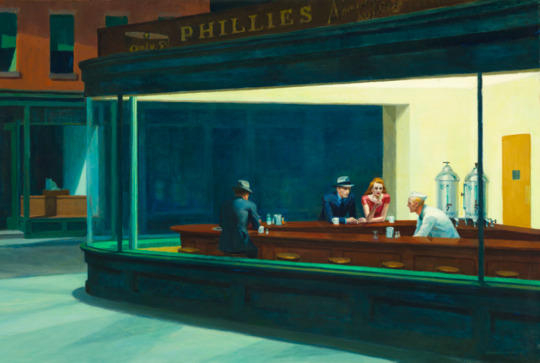
y’all’ve probably seen this one, Nighthawks (1942), oil on canvas.
In this painting, Hopper paints a view into a diner at night from outside. The street outside is silent, with no people or cars around. All of the other stores are closed. Four figures are painted into the scene: a man dressed in a white cap and coat working behind the counter, a well dressed man and woman sitting next to each other, and another man with his back towards the viewer. The three faces that you can see seem to be engaged with each other, while the man whose face is hidden seems to be distant from the conversation. The title of the painting may be based on the slang term “nighthawk” (the same as a night owl), describing people who are habitually active or wakeful at night.
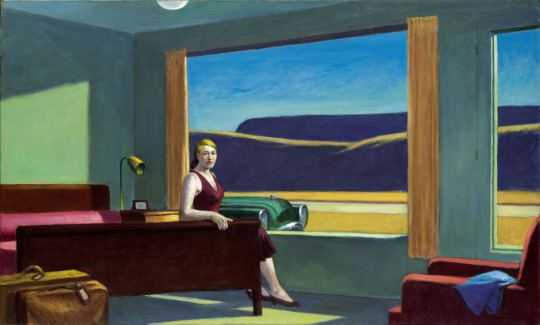
here’s another cool one, Western Motel (1957), oil on canvas.
In this painting there is a lady sitting alone in a motel room. The room is mostly empty, devoid of any personal objects, and her bags are packed. Her body language seems to suggest that she is anticipating something, as if she had been sitting tense for a while, indicated through the tight grip with her hand and her body held up straight. This image appears to be somewhat static; it doesn’t appear as if the moments before or after this would be any different, as if whatever she's waiting for will never come.
anyways, the reason I'm sharing this is because I've gotten really inspired by his work, and am working on a new project that’s influenced by his work. here are some sketches for it I guess.
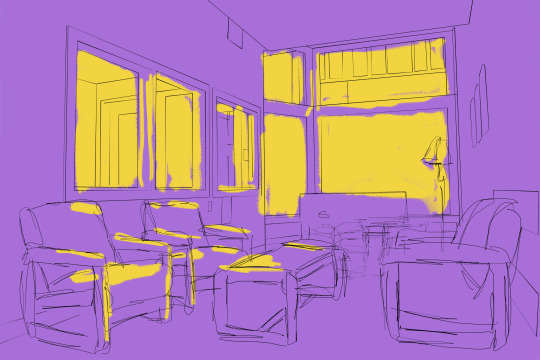
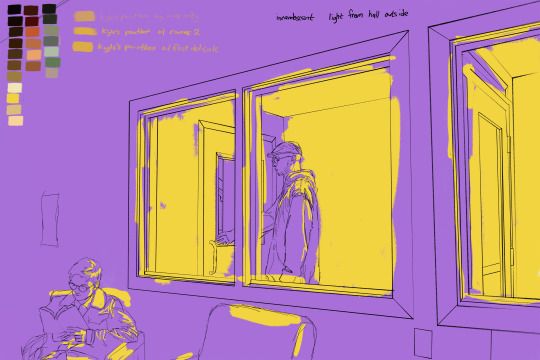
2 notes
·
View notes